#Critical Path Analysis
Explore tagged Tumblr posts
Text
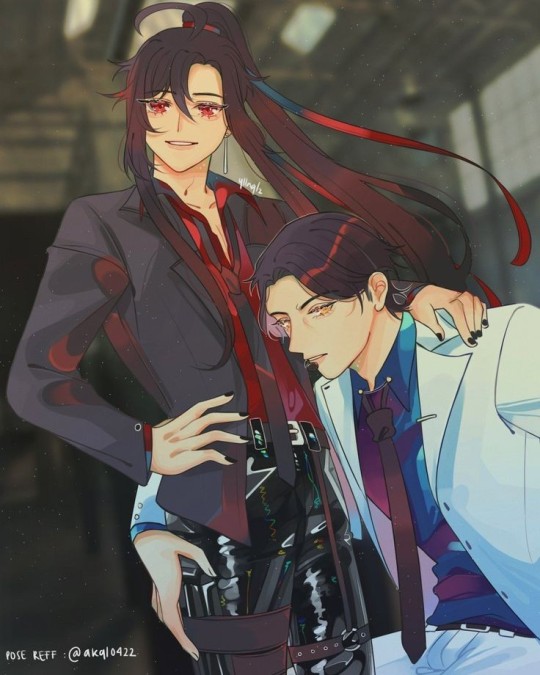
💠🧡critical path analysis
By:chinxe
Summary:
Wei Wuxian and Lan Wangji are the two top detectives of the Gusu PD's ninety-ninth precinct.
It really is a shame they can't stand each other.
(Or so Detective Wei thinks).
[detective wangxian🕵️♂️]
Chapter:1/1
Words:14,338
Status:completed
Oh, oh wow. Is this what heartbreak feels like? Lan Wangji thinks he is cruel - had it been that terrible, for him, to be forced to spend time with Wei Wuxian? For the first time in a long, long time, Wei Wuxian actually thinks he might cry
~~ NO baby it's because you are so stupid 🤧
If it’s so urgent, you can just tell him like this,” the taxi driver replies. Wei Wuxian shrugs as much as he’s able to. “Guess you’re right.” Then, inhaling, he calls, “Lan Zhan! Lan Wangji! HanGuang-Jun! Last night, on our date, I - I really wanted to make out with you!” Several things happen in the span of the next few seconds. Lan Wangji’s eyes go very, very wide; the taxi driver says, “What the fuck?”
~~ the classic [I want to sleep with you]👌
Too much information,” Jiang Cheng groans. “No,” Nie Huaisang says, tapping furiously away at his phone, “keep talking…”
~~
Wei Wuxian!” Captain Lan yells again. He looks on the verge of exploding from outrage - whoops. “I will suspend the both of you if you do not cease and desist, right this instant!” “Thank you, Captain,” Jiang Cheng says, looking immensely pained, “but I think it’s already too late for my eyeballs at this point.”
~~
#wangxian#mdzs#wangxian recommendations#mxtx mdzs#wangxian fanfic#ao3 recs#mdzs fanfic rec#mdzs lwj#lwj x wwx#wangxian fic recommend#wangxian fic recommendation#wangxian fic#wangxian fic rec#completed fic#modern au#critical path analysis#detective wangxian#detective wei ying#detective lan zhan
45 notes
·
View notes
Text
PMP Formulas Complete Certification Guide
PMP Formulas Complete Certification Guide List of Important PMP Formulas for Certification Exam This post enumerates important PMP formulas required for the Project Management Professional (PMP) certification exam. Though the PMP exam does not require elaborate calculations, considering the time constraints recalling some formulas could be a challenge. Hence this resource could be of help to…

View On WordPress
#Critical Path Analysis#Critical Path Method (CPM)#Earned Value Analysis (EVA)#Earned Value Management (EVM)#Program Evaluation And Review Technique (PERT)#Project Management Body of Knowledge (PMBOK)#Project Management Professional (PMP)#Tools and Techniques
0 notes
Text
hmmm. thinking about how veilguard seems to subscribe more to the more traditional "video game as personal power fulfillment fantasy of heroism" than any other dragon age game, except perhaps origins, though origins does it more artfully.
#da2 certainly is not a power fulfillment fantasy#and inquisition seems like it could be on the surface#but under that surface is the horror of how power corrupts#and rots you from the inside and steals everything from you even yourself#maybe thats not true for a trevelyan#but inquisition at least has the opportunity to be played as either#depending on how the world treats your character as someone they are comfortable with having power#or not#which is a commentary in itself#origins idk#it has never stuck with me the way the other 2 games did so someone else will have to do that analysis#but veilguard is sooooooo hero fantasy fulfillment in comparison#you win in the end#nothing bad ever really happens to you at all#you tell everyone what to do and they listen and love you for it#no one blames you for anything ever#you are always right#you save the day!#compare that to leandra telling hawke their baby brother/sisters gruesome death is their fault#like JHERGJKHERGKJHREG#anyway its not necessarily a bad thing#but its a very... traditional#video game narrative path#that i dont think most of us were expecting or interested in#from a franchise who has deconstructed such things in the past#veilguard critical#mine
133 notes
·
View notes
Text
Im gonna need people to take account development issues and writer intent when making a meta post cause some of you are just adding personal hcs at this point. You are so inside your head that you cannot accept that these are the mistakes and errors of the game and not intentional good faith writing choices.
The sheer lack of taking account these damn writers who have their agenda and bias during development. Sure, take what you get and make something out of it, but using it as an argument when it's all speculative makes me want to pull my hair out.
#fandom critical#salty rambles#*face in hands* please just stop acting like you have a point when you just dont#analysis includes WHY this was a topic/story that the writers wanted to explore#what is the intent of choosing this path instead of another
21 notes
·
View notes
Text
At the Peak of Truth, Despair Not
story analysis of the Diverged Paths costume set story with pure vanilla's truthless recluse and shadow milk's sage of truth, chunk by fucking chunk because i am INSANE and the parallels keep stacking up. they are the same in every universe. even this one.
this is an essay post and it is long. i am rambling a lot. i dissect certain lines in the story and talk about word choice. i also talk about how many parallels there are in this story to beast-yeast ep 7-8. i swear to god it makes sense. i am a writer by the way. fuck. anyways enjoy my insanity.
-
"Quiet, quiet! Our lecture will resume shortly! Please take your seats in a timely fashion!" A sonorous voice filled the old, quaint square. The voice belonged to a peculiar Cookie dressed in white and gold. Surrounded by a crowd of spectators, this mysterious Cookie now stood in the center of the square. He had just finished reciting an epic poem and was now explaining a convoluted philosophical concept to a freshly-baked flock, wide-eyed with wonder. "The Sage of Truth," they called him.
Setting the scene here, this is an "old, quaint square". The Sage is described here as "peculiar" and "mysterious", indicating that the cookies around him think he's odd. I'll return to the word "mysterious" later.
The word "flock" used here is also an interesting choice; a "flock of sheep". It's a backhanded way to call these cookies "sheep", which is used often in a derogatory way to indicate someone is unable to think for themself or unable to think critically at all, and just plays follow the leader instead of forging their own beliefs.
What's also an interesting thing to note is that the cookies call him "the Sage of Truth". The way this is phrased implies he didn't come up with that name, that he let the cookies name him. That, or he was waiting to be asked his name and was never asked, which I believe is also likely.
It almost seemed as if the Sage of Truth had always stood in that spot, sharing truths and teachings with anyone interested. With time, more and more Cookies came to listen to the Sage. Some said he was a professor of magic, others claimed he was an archivist, until an eager disciple decided to put an end to this dispute with a question. As always, the Sage welcomed the query with a graceful gesture. Pointing upwards, he uttered, "I hail from a peak so tall and narrow, it pierced the firmament itself!" His confounding reply caught everyone by surprise. Only then did the disciples realize that never once had the Sage spoken about himself. Yet, they wished for the lectures to continue and chose never to pry again.
The phrase here, "always stood in that spot", makes him seem more like an object, and less like a person with his own thoughts and feelings. The fact that the cookies begin to come up with things to say about him, that being that he's "a professor of magic", or that he's "an archivist", instead of asking him directly further lends to this line of thinking of him as an object.
This next part, where he is finally asked a question about himself, he exhibits two pieces of body language that show up later in the story at crucial moments. First, when he "welcomes" the query, he is being truthful about it; he wants more of these types of questions about himself. Second, when he "points upwards", he is lying; he claims to "hail from a peak so tall and narrow, it pierced the firmament itself!"
It is an exaggerated fib about the truth. This statement is immediately described as "confounding", meaning surprising or confusing especially in the context of not aligning with the inquirer's expected answer. The disciples then immediately realize that the Sage had never spoken about himself. Paired with such a confusing statement, one might think that such a realization would prompt more questions about the Sage himself, but instead, the disciples decide to focus on the knowledge he gives instead of wanting to learn about him, and so, never ask him another question about himself again.
This is why the Sage is described as "mysterious". They have never asked, and he has never told. The one time he was asked about himself, he said something exaggerated and outlandish; one can only assume he was trying to bait more questions of that nature, only for them to never come.
Another day, another fascinating lecture came to a close. The sky above began to tinge with red and Cookies headed back to their homes when a stranger entered the square. The visitor was draped in a dark cloak and donned an enormous hat that cast a shadow over his face. The Cookie stood there without saying a word and watched the Sage. The silence was broken by the Sage’s courteous greeting, his eyes having already discerned the shadow of despair hanging over the guest. "I don't believe I've seen you here before, my friend…! Alas, today's lecture is over. Care to come back on the morrow?" Yet, the dark visitor paid no heed to his words. "Stop teaching about the Truth." "Why must I?" inquired the Sage.
Setting the scene again for the debut of the Truthless Recluse. He approaches the square when the sun is setting and the sky is turning red, which is a nice bit of contrasting symbolism to Pure Vanilla representing the sun itself.
The Sage takes initiative to greet the Recluse, and immediately defaults to letting the Recluse know that he's done lecturing for the day instead of asking the Recluse about himself (not even a "How are you doing?"). One could speculate that this is a learned behavior; he is used to being used by the cookies who want knowledge from him, is never asked about himself, and as such, never asks personal questions of anybody else either.
But next, the Recluse addresses him directly, talks to him directly about the nature of what he does instead of asking for knowledge or treating him like something to wring answers from. This is probably the first time he's been talked to like this. It's a command, and he answers with a question of his own; the holder of the virtue of knowledge... answers with a question. "Why must I?"
The guest only grinned in reply and stepped closer. For the first time, a ray of light illuminated his face, and the Sage of Truth exclaimed delightedly. "Aaahh, if it isn't the Truthless Recluse himself. To what do I owe such a pleasure?" His monocle glistened with genuine curiosity. "It is said that the Truthless Recluse never descends from the Peak of Truth… How may this humble scholar be of service to you?"
It's interesting that the Sage recognizes the Recluse as soon as his face is revealed. It might indicate that they've met before, especially considering the Sage previously claimed to hail from what we can assume is the same peak the Truthless Recluse has stationed himself at.
The Sage is delighted to see the Recluse, and finally asks the Recluse a personal question, but phrases the question in an interesting way. "How may this humble scholar be of service to you?".
Calling himself humble could mean two things; that he is really a prideful person and is lying by calling himself humble to hide this fact, or, that, in choosing a passive adjective to describe himself with, he is attempting to deflect any aggression he might receive by asking a personal question. It could be both.
He also takes care to point out that he is "being of service".
The Recluse's eyes brimmed with sorrow. "Stop pretending. You know all too well that there is nothing at the Peak of Truth." The Sage clapped his hands. "Eureka! At last, the answer to the age-old question is found! Why the Recluse never leaves his beloved peak vacant! Why every Cookie who neared true enlightenment was inevitably pushed back from the ascension they so craved!"
The Recluse directly calls him a liar. "Stop pretending". The Sage of Truth is a liar! He tells lies and the Recluse can see right through them! But at least he has one thing going for him; he didn't name himself the Sage of Truth. The cookies did. They assumed he would never lie, and because nobody questions him, he has never been caught lying.
Cross referencing to canon Shadow Milk, we know that he holds resentment towards other cookies for just believing every word he said was truthful; being called out on a lie is probably something that's never happened before, especially not to the Sage of Truth.
On top of that, the Recluse is previously described as "a stranger", and the Sage mentions never having "seen him before" in the square where this takes place. All of that tied together means that the Recluse never heard the Sage's exaggerated fib about being from the Peak of Truth, and yet, somehow knows that the Sage is from the Peak of Truth. This is further evidence that the Sage and the Recluse have met before.
Upon being called a liar, the Sage of Truth reacts with delight, only to immediately deflect and deceive again. He turns the subject away from himself.
He tilted his head, expecting a confirmation. "All this time, my best hypothesis was that the Peak of Truth had been seized for good by some petty curmudgeon. Do you mean to say you sought only to protect seekers from disappointment?" The Recluse did not bother to deny the Sage's words for he loathed the Sage for guiding Cookies right into the maw of the cruel Truth. "I, too, once made the same mistake, and for that, faced despair upon the Peak… There was no Truth expecting me. No Truth to save us all. And I cursed myself hundreds, thousands of times over for my folly." And all his sorrow and despair surged forth in a single question. "Why do you persist?!"
"... seized for good by some petty curmudgeon". There's so much going on in this sentence.
If the Sage really does hail from the Peak of Truth, saying it was "seized" puts himself into a "helpless" position. If he cared about the Peak of Truth, what's stopping him from going to take it back? He is, after all, the holder of the virtue of knowledge, a godly power in his own right. Saying it was "seized" puts him in a helpless position and absolves him of any blame for anything that happens to it. Holding the power that he does at his fingertips also implies he doesn't care about the Peak of Truth at all, and is content to let it fall.
He says he'd thought the Truthless Recluse was a "petty curmudgeon"; I'll admit I had to look this word up, but it means a stubborn, ill-tempered person, typically an old man. Really funny actually, but he's negating this insult.
The Sage asks if the Recluse is turning cookies away from the truth to protect them from disappointment. The Recluse doesn't deny it; he "loaths" the Sage for guiding cookies towards the truth. Inverting that sentiment would imply that the Recluse turns cookies away from the truth to avoid disappointment, and uses deceit out of compassion for them. This is to prevent them from getting hurt, because "he too made the same mistake" of ascending to the truth, finding only despair instead.
The truth being described as a "cruel" "maw" is also such interesting imagery. It reminds me of Shadow Milk's snake that devours the sheep on the loading screen of the Awakened Pure Vanilla update. I'll also point out the fact again that the Sage's listeners were explicitly referred to as a "flock".
And finally, the question the Truthless Recluse asks the Sage of Truth. "Why do you persist?"
Because as far as the Recluse is concerned, he just got done explaining why the truth isn't worth it, so why should the Sage continue to preach it? Why do you persist?
It's a question asked out of a genuine, haunting, need to know why the Sage continues to send cookies into the hungry, crushing maw of Truth. It's asked out of desperate compassion for those cookies.
To that, the Sage only pointed upwards and said, "Alas, the Truth is imperfect by design… and yet, one must not turn away from the light of one's own Truth." And with a welcoming gesture, he added, "Not unlike yourself whose Truth is to protect others from anguish." The Recluse never answered. The Sage knew the answer anyway.
Here, the Sage points upwards; a previous indication that he's being deceptive. The statement he gives, "One must not turn away from the light of one's own Truth", seems to imply that he wants anyone listening to him to think that he thinks the truth is a good for cookies, of course, why wouldn't it be? However, throughout the entire story, the truth is regarded by the Sage as something negative, something that's been used to hurt, used to treat him like an object. So to truly answer the Recluse's question, what he's really implying here is that he guides cookies towards the truth because he's hurting, and he wants them to hurt too.
Next, he welcomes; a previous indication that he's being truthful. A welcoming gesture; spreading his arms wide, inviting the Recluse in. He truthfully wants the Recluse to call him out on this lie. He truthfully wants the Recluse to continue to speak with him. He sees an equal, a companion in the Recluse. Someone who understands.
This is such a blatant parallel to Compassionate Pure Vanilla offering friendship to Shadow Milk in episode 8, I would just like to point that out.
The Recluse never answers, but the Sage knows the answer anyway. Whether or not that "answer" is an agreement of companionship or a rejection of it is unclear, and is probably meant to be left ambiguous.
A long night passed and a new day dawned. Yesterday's guest was long gone, and the square was as peaceful as it could be… But the Sage could hear them. The footsteps of many seekers, stepping forth towards the Truth.
"The square was peaceful... But... the Sage could hear them."
This ending is very painful. The cycle of hurt continues. It would imply the Recluse rejected the Sage's offer of companionship, which is probably more likely here. However, the nature of the ambiguity means the Recluse could have accepted, and the seekers of truth may be what links the Sage and the Recluse now that they are apart. It's less likely.
Either way, they are the same in every universe. Even this one.
As I put it in a previous post, the difference between Pure Vanilla and Shadow Milk, no matter which path either of them are on, is their compassion.
The Truthless Recluse pushes cookies away from the cruel truth, while the Sage of Truth encourages them to seek out what he knows will hurt them.
Because even on diverged paths, Pure Vanilla will always care, and Shadow Milk can't ever find a reason to.
#cookie run kingdom#shadow milk cookie#pure vanilla cookie#truthless recluse#sage of truth#cookie run#maedia analysis#now if you'll excuse me.#there's a trout population to fuck up and drywall to eat.
471 notes
·
View notes
Text
Lilith Analysis
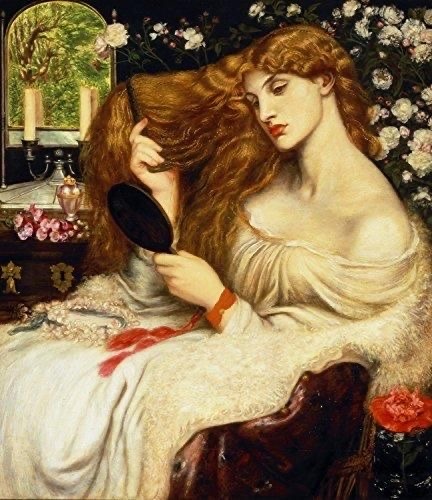
(Lady Lilith, by Dante Gabriel Rossetti)
In my perspective, Lilith symbolizes the female intuition which is often vilified in our patriarchal society. She questions the status quo, defying societal norms and forges her own path for how she lives her life. In some interpretations, Lilith is depicted as the serpent in the garden, tempting Eve with the apple as revenge for her expulsion after refusing to submit to Adam. Targeting Eve instead of Adam, shows how Lilith understands the curious nature within women to want to know more and what ifs. It is the same curiosity that made Pandora open the box releasing malicious spirits into the world.
The energy of Lilith is a vengeful one as she sought revenge against God for her banishment out of the garden. In her expulsion, she was stated to steal babies and harm innocent lives, unsympathetic to anyone in her way. So within our charts, Lilith shows where we've experienced profound shame and societal rejection. It is where we are often demonized for refusing to yield to others' expectations. If we don't heal this pain it often becomes a form of self-destruction, fueling a need to gain revenge, harming anyone in our path. This part of our chart is usually suppressed, relegated to the shadows, but integration of this energy is crucial. Mainly because keeping our shame underneath the surface will often cause self-sabotage within the house Lillith is in. Finding the underlying root of the problem will often lead to reclaiming of your power, making Lilith be an energy of magnetization and authority. Neglection will only exacerbate internal conflict.
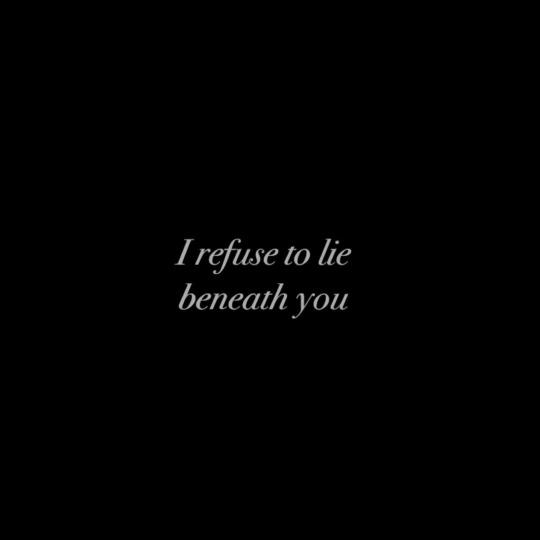
Lilith in the 1st:In the first house, these individuals are the walking embodiments of Lilith. They are often faced with deep-seated feelings of shame regarding their sexuality and physical appearance. Many have endured the pain of bullying in their youth, which has made them feel shunned out from society. This shame becomes a heavy burden that feels as if it is a part of them, complicating efforts to express their true self openly. Consequently, a portion of their identity remains veiled, guarded against potential judgment or rejection from others. Yet, beneath this veil within their unconscious, lies a potent magnetism. A profound sense of sexuality that others find rather attractive or unsettling. They find themselves both desired and feared. But honestly like Britney said it’s because, "All of the boys and all of the girls want to if you seek Amy." Lilith's influence in this house encourages independence and self-assertion. It teaches the importance of standing firm in the face of societal pressures and refusing to be demonized for your own authenticity. However, yielding to criticism and seeking external validation risks facing internal conflicts. A constant battle against yourself. That is why confronting the shadow aspects of one's personality should be practiced, as it offers a pathway to self-discovery and empowerment. When you are able to show resilience and unwavering faith in yourself, you're able to garner admiration and respect from those around you. The ability to transmute pain into productive actions serves as a magnetic force, attracting allies and opportunities alike. Learning to embrace your inner sexual energy is imperative, as it is something that cannot be suppressed. Unfortunately, this embracement may invite unwanted attention, leaving you vulnerable to exploitation and trauma. Overall, the role of Lilith in the first house is one of self-acceptance and defiance against societal norms. It's a journey marked by challenges, but also by profound personal growth and authenticity.
Lilith in the 2nd: In the house of personal gains, Lilith has felt great shame surrounding her personal values. Individuals with this placement have a hard time surrounding their self worth and physical assets. Possessive tendencies lie beneath the surface, as a consequence from being betrayed in the past. People may have taken advantage of them for their material value and stolen from them. Financial wounds run deep making them unable to properly trust themselves with money. Might find themselves in cycles of reckless spending, prioritizing instant gratification over long term investments. The types go on a shopping spree and then feel guilty for indulging materialistically.These people can either be overindulgent or extremely picky when it comes to what they spend. There is an inherent value of pleasure and spending resources on things that make you feel good.The sign Lilith is in will give you an idea on what you unwarily spend money on and guide your financial decisions. Implementing a budget plan can be very beneficial in uncovering and healing shame surrounding your spending habits. It will help you regulate your spending. Underlying shadow challenges when it comes to self worth is another aspect of this placement. Leading to having doubts about deservingness and attaining success. Lilith in the 2nd, prompts a reevaluation of your values. Rather than being overly picky, you're encouraged to be intentional in your pursuits. Learn to align your investments with your deepest values and aspirations. Family dynamics may also contribute to your relationship with money, with the possibility of past generations engaging in questionable financial practices. Additionally, Lilith's immature aspects may tempt individuals to resort to unethical means of acquiring wealth, such as engaging in sex work or participating in illicit activities. However, succumbing to these temptations risks exploiting others and ultimately perpetuating cycles of harm. In navigating the influence of Lilith in the 2nd house, you are urged to exercise caution and integrity in financial dealings. By confronting shadows and cultivating a sense of self-worth, they can transcend shame and reclaim power over their financial well-being.
Lilith in the 3rd: When Lilith is in the third house of youth and mental stimulation, these individuals have deep shame within their speech and communication. Oftentimes they were demonized as a child, facing constant scrutiny about their childish behavior. Parental guardians made them seem like they were to blame for the smallest issues that occurred. In school they may have felt shunned out from their peers, becoming the target of bullying and ridicule. This ridicule can even come from their teachers that overly criticized them for not being the perfect student, leading them to feel like they were a bad kid. Might indicate having a speech impediment, having a hard time communicating how you feel and issues surrounding being able to read. Your intelligence was significantly downplayed from the earlier years of school which made you believe you were dumb. For this reason, you may prefer being quiet and only speaking when you are needed to, often avoiding starting conversation. To others you may seem standoffish when you speak, but instead it can be anxiety to say what you really want because of public reaction. This Lilith wound is one centered around your inner child and taking back power over your mind. Intrusive thoughts of feeling less than can often be an underlying trigger, but you must recognize that these voices in your head are not your own. It is programming from the ridicule you received as a kid. Mindfulness and meditation practices can help regulate the outside input that comes in your head. You're a very intellectually capable individual that often understands knowledge about topics considered unconventional by society. Don’t be ashamed of what you know and use it to teach other people information you are passionate about.
Lilith in the 4th: Within the house of home and heritage, Lilith has wrested with feeling of shame for her family background. These individuals can often grow up feeling sexually repressed by their family. Criticism for what they were and being called a slut for wanting to express themselves. This placement reminds me of Meg from Family Guy, and how she is consistently made the butt of all ridicule by her family. As you went through puberty, you could've felt uncomfortable being objectified by family members. Some could've faced even faced exploitation by their own family. There is a strange focus on purity within the household and committing towards conservative ideals of presenting yourself. From their point of view, you may be seen as someone who is promiscuous and disobeying traditional values. You might find it hard to feel at home within yourself because of these past afflictions. This can even lead to you feeling ashamed about your emotional responses, often viewing them as evil instead of necessary feelings. Aside from sexuality, this Lilith placement also indicates having shame regarding your origin. There might have been concealed truths about your birth, unraveling as you mature. Might have felt like your family were strangers and you did not belong with them. Issues with the mother figure can be highlighted by this placement. You don't get along well and could feel a sense of cruelty from her. A shadow side to you is kept veiled from your family, which makes you feel like an outsider by them. You may have a reputation of being the rebellious cousin. They may harbor outdated ideologies such as racism, homophobia and xenophobia, that makes you more ashamed of them. The home you grew up in may have been the cause of this shame too, because of its design or infestation issues. Overall, stepping away from your family's point of view of the world is a big factor with this Lilith placement. You cannot allow their lives to dictate who you are meant to be. Learning to nurture yourself and finding your own community is an essential part of your journey. As time pass, you may discover yourself becoming a space for other people to confide in about their personal issues. A testament to Lilith making a home for herself outside the boundaries of Eden.
Lilith in the 5th: In the fifth house, individuals have grappled with profound shame surrounding the way they experience pleasure within their lives. Their childhood may have been faced with restrictions on the ways they could have fun, such as engaging in hobbies solely to appease their parents rather than for personal enjoyment. Activities you found enjoyment in, felt like you needed to keep hidden away from other people in order to not get ridiculed. There are plenty of hobbies you enjoy that others will find unorthodox to have. For example, going to shooting ranges, participating in drag shows, taking part in the circus or cosplaying your favorite characters. When it comes to your talents, you might face envy from others because they want the attributes that you have. May face hate in your extracurricular activities and being outcasted by team members. In your own eyes, your often unsure about your talents and feel like you're not good enough in your practice. Additionally, there is also shame regarding sexual pleasure. You might find it fun to explore, but some experiences make it unsettling for you to enjoy. There may be a need to keep your sex life a secret from other people. However, sex positivity can be a notable aspect of this placement though, not having much conservative notions in your sexual experiences. When it comes to children, you might feel some shame for not wanting to have kids and face scrutiny from others for this stance. You can even feel like you hate the thought of children and not wanting them around you. If you do end up having kids, they can exhibit Lilith quality traits of rebellion and unorthodox behavior. There is definitely a shadow side to how you gain pleasure with this placement, indulging in self destructive behaviors and selling yourself away for fun. You must learn to tame that primal urge within you when you are having a great time. Especially as this can lead to addictions to pleasure, such as having a gambling, drug abuse and being overly sexual. Learn to set boundaries when you're having fun.
Lilith In the 6th: In the house of service, Lilith plays a commanding role within her work space. This placement reminds me of The Devil wears Prada, where Miranda was seen as a formidable figure by her colleagues. Similarly, coworkers may harbor similar feelings toward you, casting you as assertive & harsh. You may face a lot of scrutiny in the workplace and could even work in an environment where there's a prevalence of discrimination. Workplace harassment can occur here as well, oftentimes facing oversexualization. Navigating and accepting your shadow persona in the workplace becomes essential. As long as you come there to do your job, that’s all that matters. Just try not to lash out at your colleagues because of misconception and other issues. There may be a big rumor that you are lazy for not doing as much as everyone else. However, you're the type of person that only comes and does the work that is necessary, not overworking themselves as everyone else. On the flip side, you can be hyper focused on work and do a lot more in your day that others don’t really see. This can take a toll on your health and work stress can be a big indication of this placement. Speaking of health, you might have a terrible relationship with health officials. Health experts in the past might have treated you poorly and even faced a misdiagnosis. Your relationship with health overall is something you can feel intense emotions around. A health condition could make you feel like you don’t have the same capabilities as other people. Might struggle with digestion and eating food to nourish yourself. There is a lot of necessary shadow work to uncover within your habits and daily routines with this placement. Learn to not be so hard on yourself, making time to properly maintain your physical needs.Health is wealth after all.
Lilith In the 7th: When Lilith lies in the house of partnerships, there is often shame surrounding the close connections these people have. They often easily attract people with Lilith energy in their lives, such as rebellion, ostracization and outcasts. You're often able to see the version of others that they keep hidden underneath. For some reason, people can feel like they can trust you with their problems and you make space to not judge them. Something about you just allows people to feel easily able to open up their shame to you. It might be because there is a part of you that has felt the same shame of being shunned out by other people. In your love life, there could be a tendency to feel outcasted by your partners which leads to having a warped perception of yourself. Partners often can make you feel like you are too much and incapable of being loved. May find it hard to feel their needs being met in their personal relationships. Here lilith indicates issues of being taken advantage of by other people and personal power being exploited. Aggressive aspects can also show facing abuse, which can make these individuals pretty guarded when meeting others. You could feel the need to be in control and have a dominant role in your love life. However, self-destructive tendencies may spur from not getting what you want out of a partner and lead you sabotaging your connections. You can often pursue relationships you know are unhealthy for you. There’s a tendency to want people that bring out an unhinged version of yourself, becoming a whole different person with a partner. Shadow work needs to be done as to why you chase these toxic connections, which sometimes is rooted from the way you viewed the partnership of your parents.
Lilith in the 8th: In the house of death and loss, Lilith is put to face the extremes. Each time they are in a transitional phase in their lives, they get kicked out of their paradise. These individuals understand the darker sides of life and are somewhat good at navigating their shadow. Shadow side can often take things to the extreme when they are out of control. Really good at understanding the taboo and being okay with things that are scarier for other people. A necessary need to make peace with inner demons and resolving past psychological conflicts. While they are able to easily exude a seductive persona, sex can be a harsh topic for them to feel comfortable with. Losing their virginity might have been a monumental experience that shifted the way they act in their lives. There is a need to work on resolving issues with sex and not being afraid of it . Also, you might be into some fetishes that you feel the need to keep hidden from other people. Hiding is a big coping mechanism for them, whenever they feel like the world rejects them, they bury themselves down in shadows to not be seen. A distinct relationship with death, some hold huge guilt for being unphased by death, while others worry about their own deaths. If a family member had died, you might feel guilty for not being sad or crying at the funeral. These people can mourn their innocence a lot, thinking of a time they were untouched by the world around them. During transitional phases of your life, you could be vilified and demonized for acting differently. Might have had a dark aesthetic or emo phase during your teen years. Change can be a scary thing for you and you could harbor strong resistance towards new possibilities. This mainly comes from the scrutiny you’ve felt by other people. Learn to embrace the taboo and understand change will only allow you to reclaim your power.
Lilith in the 9th: These individuals hold a complex relationship with religion and belief systems. Growing up, they likely experienced a religious environment that instilled fear and submission to authority. It's possible they had overly religious parents who prioritized adherence to faith, rather than showing genuine love and understanding for their children. As you mature, there's a tendency to reject traditional systems of beliefs for more esoteric philosophies, helping you find empowerment through alternative spiritual paths. Although shifting your beliefs will allow you to have a sense of freedom, remnants of past religious trauma still linger in your mind. Guilt for what you believe in is a big focus for this placement. They often find themselves at odds with mainstream perspectives, feeling a sense of alienation and struggling to fit in. There's a tendency to doubt their intelligence and the information they know. This struggle extends to academic pursuits as well, where they may feel out of place and struggle to connect with their peers. Moving away from their area of upbringing can be liberating, allowing them to explore their shadow aspects and embrace their darker side through travel and adventure. In doing so, they may discover a newfound magnetism and allure, attracting others to their path towards self-discovery.
Lilith in the 10th: In the house of public career, Lilith exerts a strong influence on one's outward image and persona. When in public settings, you often see people being easily magnetized towards you. If Lilith is conjunct the Midheaven (MC), it can signify experiences of unwanted attention, including catcalling. There's a deep-seated fear of being seen, stemming from the difference between your public persona and true self-image. Overexposure to the public eye can lead to discomfort, particularly in career fields where others seem to dominate or overshadow you. There is a natural ability to exude sensuality that others find intriguing. They may develop a reputation for sensuality and allure, which can intimidate others, particularly men, due to the inherent power they radiate. Despite the fantasization, they may resent the objectification and sexualization. In professional settings their bosses may even attempt to take advantage of them. This placement can also indicate stage fright and social anxiety, causing them to prefer the sidelines rather than the spotlight. An unbalanced version of this placement would be sabotaging yourself when it comes to your career. Promoting bad behavior so that you can gain the upper advantage in situations. It's crucial for them to be vigilant against exploitation by authority figures and to properly navigate professional relationships and contracts. Despite potential misconceptions about their character, individuals with this placement must embrace their authenticity and prioritize their own career aspirations over societal expectations. Your that b*tch for real, and you cannot allow the public opinion of you to dictate who you are. Also, Lilith in the 10th house may signify a challenging relationship with their father, involving absence, mistreatment, or attempts at control. This further fuels aspirations to become a successful person, in order to prove their farther wrong. Embracing their power and authenticity is important for success and fulfillment in the professional world.
Lilith in the 11th: Friendships are never easy with Lilith in the 11th. Despite outward display of support, these individuals frequently encounter betrayal from those they consider close allies, discovering that supposed friends harbor secret animosity and ulterior motives towards them. Friends could make jokes about insecurities you have, while accusing you of being soft for finding offence. Your secrets are not the safest within your social networks, they are like blind items ready to spill all the tea about your personal life. This atmosphere of distrust can lead to a cautious approach to forming friendships, resulting in a preference for family and romantic relationships over the unpredictability of friendships. Despite these challenges, individuals with this placement often gravitate towards unconventional or marginalized groups of people. Finding companionship in the outcasts who defy societal norms. They may become strong advocates for the rights and liberation of marginalized groups, focusing on the need for women's rights and the empowerment of societal underdogs. So while friendships may be met with much difficulty, these individuals create meaningful connections with fellow non-conformists in society. Finding solidarity in their shared struggles, leading to finding community outside of Eden.
Lilith in the 12th: Individuals with Lilith in the 12th house tend to keep Lilith's energy to the depths of their subconscious mind. They are often unaware of its magnetic, rebellious, and sexually charged nature. May doubt their own sexuality and seductive capabilities, feeling overshadowed by others charm. However, when in solitude, Lilith emerges to confront them about their inner shadows and demons. This often leads to solitary battles with their deepest fears and insecurities. Sleep issues are common with this placement, as they may struggle to maintain a stable sleep routine. May prefer the quiet solitude of the night for introspection and self-discovery. In their dreams, they often confront scenarios designed to evoke feelings of inadequacy and shame, forcing them to confront their inner vulnerabilities. They can be drawn towards dream working, meditation, shifting and exploring unique ways to access their subconscious mind. By using the arts, they can transmute fears and underlying issues in their mind to a reservoir of creativity. You can often see their shadow portrayed boldly in their art. Also, these individuals are often empathetic and hold nonjudgmental view towards the shadows of other people. Overall, through uncovering their darkness, Lilith in the 12th house can lead to spiritual growth and artistic development when integrated unapologetically.
____
Remember to look at the aspects to Lilith in your chart. Since it is an astrological point & asteroid, it doesn't hold as much significance compared to the planets. So aspects allow you to know how much of this energy can be brought up to the surface. Also, this reading is for all versions of Lilith in the chart.
-your Star Darling
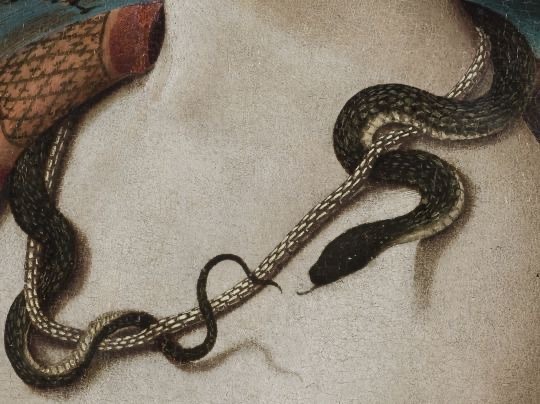
(Portrait of Simonetta Vespucci, by Piero Di Cosimo)
#astro community#lilith#lilith astrology#astrology observations#astrology#black moon lilith#lilith in the houses
2K notes
·
View notes
Text
NOCTIS' TRANSFORMATION ANALYSIS

"We carefully considered the path of Noct's life and sought a design that would convey his humanity with with the passage of time. I asked Naora-san to look at him as a real person and to depict his aging with realism rather than symbolism." - Hajime Tabata
The decision to age Noctis up from a 20 to 30-year-old not only enhances Final Fantasy XV's coming-of-age story of a young, unprepared prince transforming into a fully matured king, but also offers a unique insight into the choices made behind the external, physical changes intended to reflect said internal development. I've seen a lot of conversation about his altered appearance ranging from approval to confusion to downright rejection. So, as someone who enjoys analyzing faces and character design, I'd like to explore this change in depth. How did Noctis go from the stereotypical clean-shaven, spiky haired anime pretty boy to a rugged, masculine man? Were the changes too bold? Does he even still look like the same person? And what does his evolution say about other men in the Final Fantasy franchise?
FACE SHAPE


Noctis' face is symmetrical and well balanced with nearly equal thirds, the lower third of which increases slightly in length at 30. I drew over his jawlines as best I could manage as his hair is in the way on both and older Noctis' face is angled slightly downward, making these guidelines less accurate to compare but, even at a glance, it's not hard to see that his face and chin do widen at 30 to accommodate a squarer jawline.
It's normal for many men's jawlines to develop a little as they age but it typically emerges during puberty. At 20 years old, Noctis should probably already have the jawline he has at 30 or close to it. Of course, a jawline can be strengthened through various means but, unless Noctis was mewing in that Crystal for a decade, this change doesn't make a lot of sense to me, which makes it more of a stylistic choice to emphasize his older age and to add a notable dose of masculinity which naturally takes a step away from the younger, more 'feminine' appearing traditional Final Fantasy face type. Compare young Noctis or Cloud's face to someone like Lightning: the overall shape isn't too different and certainly a staple of the franchise regardless of gender.
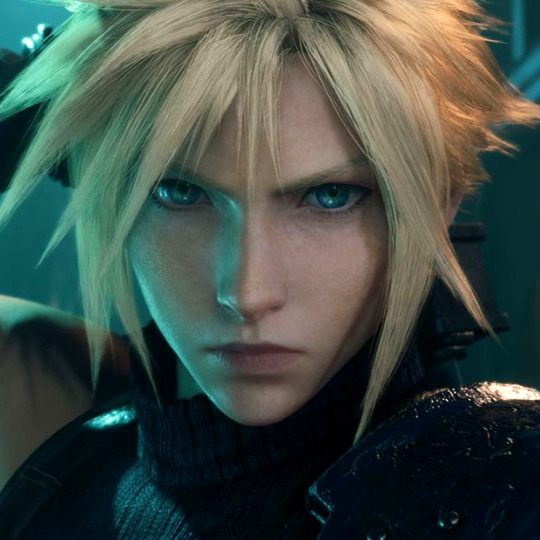
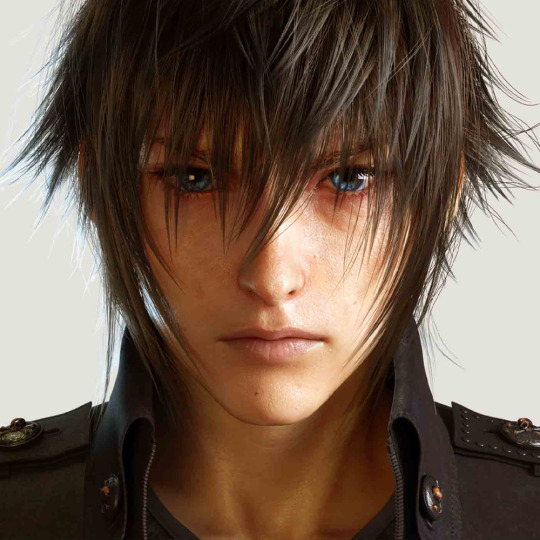
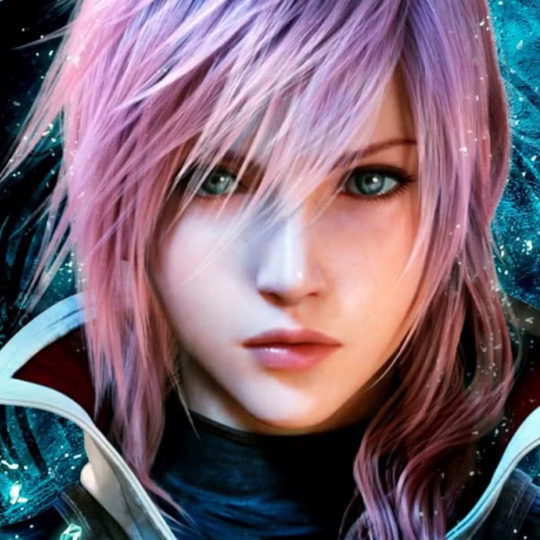
EYES
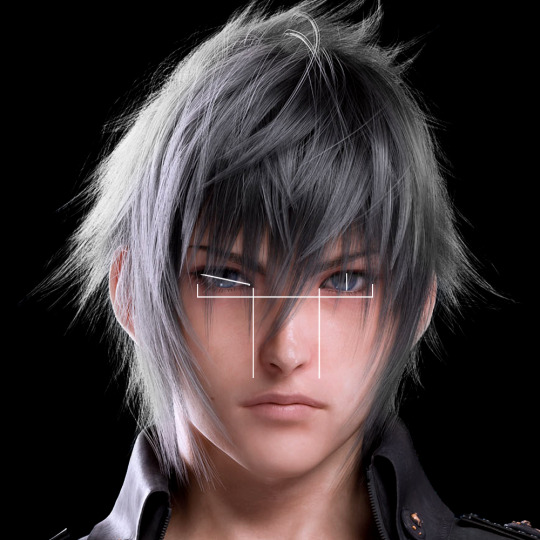

(For the sake of better comparison, I've edited 30-year-old Noctis to have his natural blue eyes)
I've seen complaints that the change in Noctis' eyes makes him look less Asian. He is biracial, of course, and his features aren't and shouldn't be considered fully Asian, but I believe the reason behind this criticism is that, in the effort to contract and narrow his eyes to be more realistic at 30, his epicanthic fold is less visually obvious as his lacrimal caruncle are enlarged, which inadvertently makes his eyes look comparatively less Asian. This change serves to shrink his eyeball while taking up the same margins on his face with the length and even eye slant all remaining identical as far as I can tell, as is the overall shape and space between the eyes.
Noctis does maintain the same basic eye shape from childhood to adulthood, it just narrows as he ages which is completely normal. Despite the particular tastes of the Final Fantasy franchise, having larger eyes to depict youth is very common in animation of any kind with children bearing especially large eyes that shrink as they age. This was no doubt the intention here as well to depict Noctis' relative adolescence at 20 and continue to embrace their stylistic history of other Final Fantasy games.
I also want to note that his eyelashes are less thick and prominent at 30, which acts as yet another change for realism and a step towards a more masculine appearance.
NOSE
(Consult the previous images)
For many faces, the edge of the nose typically lines up with the inner corner of the eye which they finally do for Noctis at 30. As I've already stated, the margins of his eyes did not change, which means the alteration in nose size to be accurate to realistic proportions where it wasn't before contradicts the stylistic choice to purposefully give him a smaller, slimmer nose at 20. Also, though I don't have a comparison shot of his profile at both ages, his nose obviously not only increases in width but also length at 30 to match his altered proportions.
EYEBROWS

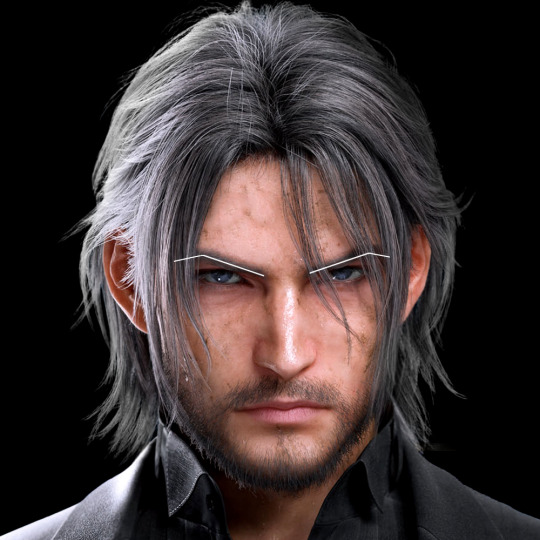
Where some changes are more subtle and feel like logical extensions of what came before, one of the more striking differences between 20 and 30 is Noctis' eyebrows as he loses the thin, manicured brows of youth and gains, well, more natural looking male eyebrows. I will point out that they appear lower on his face at 30 because he's tilted slightly downward and bears a more intense expression than the neutral pose at 20 which makes the exact angle a little harder to compare here but, that being said, I do believe they sit slightly lower on his face at 30 in general. Though they sit at essentially the same angle, the overall shape has changed a bit. Not only do they become thicker, they also frame the eyes more along the browbone which is very different than the sharp, nearly straight line of the brows in his youth.
Choosing to change his eyebrows so significantly is an interesting choice and perhaps one made not only to be more realistic and less like Final Fantasy characters of the past, but also to look more like his father as was part of their intention with his older appearance.
It doesn't necessarily feel like a choice borne purely from age either as Prompto and Ignis maintain their previous, thin eyebrows even in their 30s (as well as most of their other features). Instead, this alteration (among others) feels more in line with Gladio who, as the most traditionally masculine member of the group, similarly boasts thicker brows, a squarer jaw and facial hair, further proving that this is the direction they wanted to take Noctis as well.
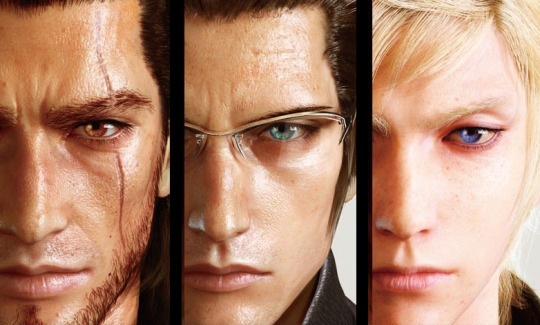
LIPS
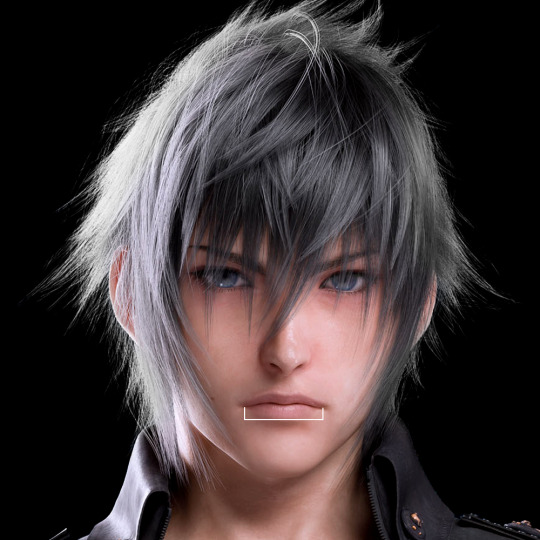

There's not much to say about his lips as they remain the same shape and are only lengthened a little. Typically, the outer corners of our lips correspond to near the center of the eye but, as his eye margins have not changed, the slight lengthening of his lips is yet another adherence to realism to better fit his adjusted features and widened face.
EARS
(Consult previous images)
Ears typically line up with the top of the eyebrow and the bottom of the nose and, though his photo at 30 is tilted more downward and this naturally changes the angle of his ears and makes them appear higher on his face, they seem to be proportional at both ages. That being said, based on these images alone, they do seem to change shape to me with the outer helix appearing to stick out farther at the top and taper in slightly towards his lobe at 30 whereas his younger ears appear narrower at the top, rounder overall and widest towards the middle. Our ears can change shape and size as we age, of course, I'm just not sure there would be a noticeable difference after only a decade, and they could have potentially been left unchanged in my opinion.
HAIR
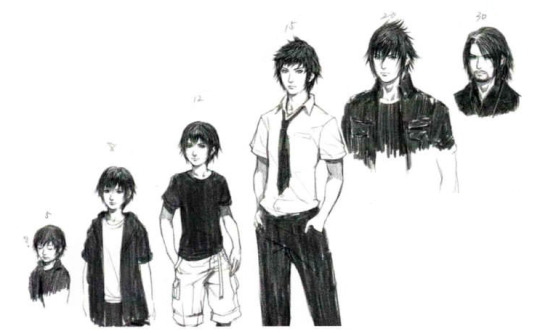
"From their [characters] hairstyles and clothing as children to the expressions and posture they develop as adults, their individual traits and the way they change over the years all inform the looks we created." - Yusuke Naora
I think it's important to note that Noctis maintains the same basic hairstyle for the majority of his life from a child into his teens and early adulthood, which feels indicative to me of how it's meant to convey that he hasn't truly grown up yet. The abandonment of this style for the first time in his life at 30 reflects great inward change: letting go of the boy he used to be and becoming a new man.
Though his two hair styles seem vastly different at first glance, I love that the foundation of the first is easily identifiable in the second. The boyish bangs and choppiness at 20 help to emphasize his youth - an element that is largely abandoned at 30 in an effort to help him appear more mature as he adopts a rugged, unmanicured style that enhances his newfound regality. The formerly long and well-maintained face frame has been shortened slightly with loose strands left to fall randomly rather than sustaining a clean sweep over his cheeks. Where the bangs have gone, a few errant strands remain to fall across the left side of his face - a vestige of what once dominated the area (and a similar feature to Ardyn as well). The vertical, gravity-defying spikes at the top of his head have been abandoned entirely and left to join the cascade of hair falling down his neck at greater length and the spikes at the sides of his head have also been left to curl softly over his ears. The results feel inevitable for a man who has left his hair mostly untouched for a decade (with some tidying up) and a natural extension of what came before.
While we're discussing hair, I also want to address Noctis' beard. Love it or hate it, it certainly aids in helping him appear much older and kinglier (a direct reference to his father) and also acts as further evidence of his Asian ancestry as the texture and lay of the beard hair is noticeably different than that of his father's, Gladio's and the other White men around him.
SKIN
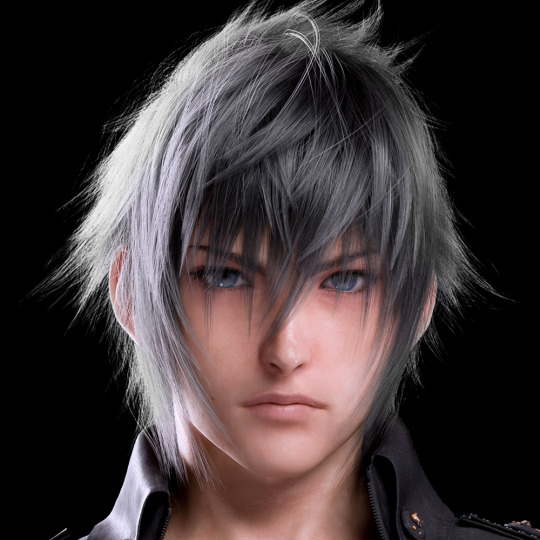
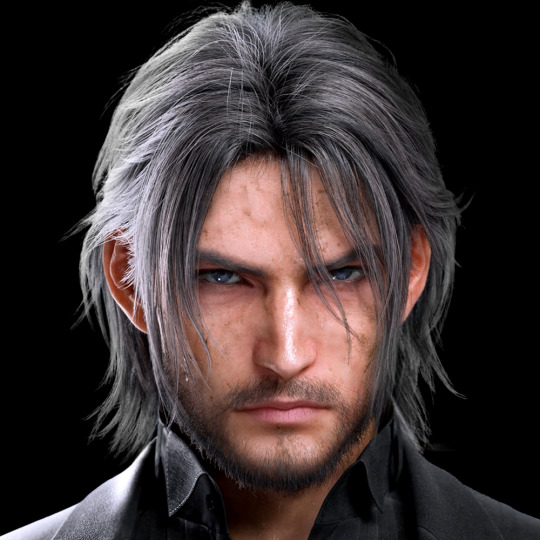
Barring the fact that older Noctis in this image (and throughout most of that chapter of the game) is usually very dirty with a face marred by sweat and grime, his skin tone is also noticeably warmer. I'm not sure why this change was implemented and allowed him to go from a paler skinned youth to a warmer skinned man (especially not having been touched by sunlight in a decade), but perhaps it's a result of his new power and another step toward realism as there may be a tendency to have Final Fantasy protagonists be paler skinned in general as a stylistic choice?
It also goes without saying that Noctis was given a few small moles at various places on his face to give him more realistic skin and not a flawless, porcelain doll look.
AGING
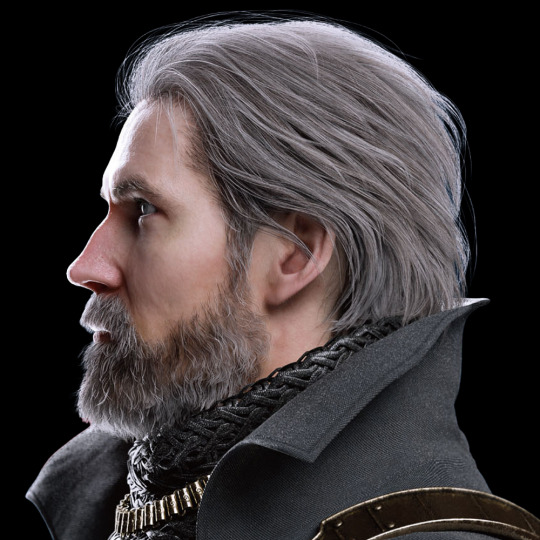

"We didn't just add typical aging details, but also referenced images of war veterans and actors to find the 'sublime' characteristics, from single wrinkles to hair tips that could express the magnitude of Noct's fate and life experiences. Also, in keeping with the father and son theme, we made it so you can see Regis in Noct's face, with features such as the beard bearing his essence." - Yusuke Noara
I believe the main narratively validated reason Noctis' appearance receives such a drastic change over the course of 10 years while his companions were barely altered, is no doubt attributed to his unique aging from the power he now possesses due to his time in the Crystal. We know that simply wearing the Ring of the Lucii has a physical cost even for those meant to wield it as it can scar and age prematurely. This led to Regis aging rapidly due to his overextension of power upholding the wall, looking arguably older than he should at just 50 years of age. It's also a marked leap from how he looked just 12 years prior. His black hair had been bleached to grey and his body composition clearly waned given his difficulty with mobility.
Having been imbued with such immense power for so long, it's no surprise that Noctis has also aged at an abnormal rate, perhaps biologically looking closer to 40 rather than 30, I dare say, just as his father appeared older than his actual age. This aging, of course, led to all the altered features discussed above as well as more visible fine lines under his eyes and slightly greyer hair, the latter of which is harder to notice in the main game, but a clear distinction made in the hyper-stylized Pocket Edition.
BODY
I've seen some comments lamenting that Noctis' older face makes his head look a little too large for his body. Though I'm not entirely convinced his head was actually enlarged overall, it could appear that way given his widened jaw and possibly neck that inadvertently produced a sense of disparity as his body remains the same as it did at 20 - the only thing that didn't change about him over the time skip.
We know Noctis was essentially frozen in suspended animation inside the Crystal for 10 years and was ostensibly sustained without food or water due to its power. However, time still clearly passed for him as Noctis' mind has matured just as his face, but his 20-year-old body is left untouched. It obviously doesn't make sense for him to have gained any muscle without exercising all those years, but I'd argue that altering his body by increasing his muscle mass even just slightly could have avoided the complaint regarding his head size as it'd allow his new face to match better as well as continue to support him feeling older and at peak strength given the Crystal's immense power now surging through him. A mild change here could have made a big difference, but this is just what I would have done.
CLOTHING
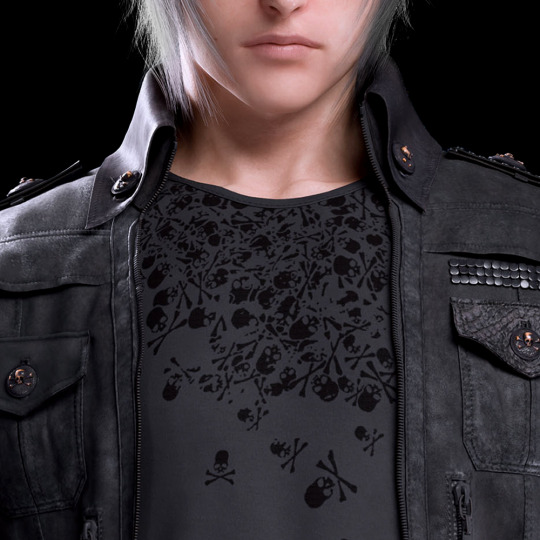
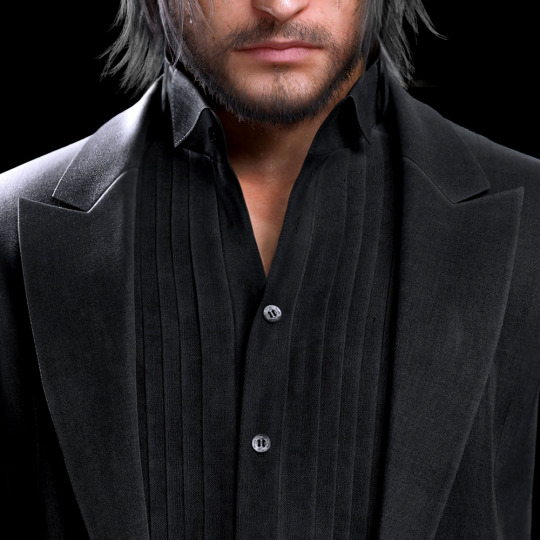
Let's quickly address Noctis' evolution via clothing as what a character wears is just as important in reflecting their identity as their physical appearance. Dismissing the optional outfits you can choose to put him in, I'll be focusing mainly on his default 20 and 30-year-old clothes as these are what the creators intended to best suit him in their respective sections of the game. This leap in style is as seemingly vast as his physical changes and helps to emphasize his growth just as much as his face, albeit with some base elements that are maintained such as the continued adherence to all black clothing (of course) as well as the use of a jacket and collar.
Young Noctis' appearance from hair style to clothing is obviously very youthful and not overtly regal - at least not to the degree you'd expect from royalty. Noctis clothes feel modern and edgy adorned with skull motifs, resulting in a style that feels a bit rebellious and incongruent with his father's pristine, kingly wardrobe and even that of the immaculately clothed Luna, both of whom are characters he's meant to emulate to fulfill his destiny. In this section of the game, Noctis isn't particularly ready for the role, as his clothing helps to emphasize.
As a 30-year-old, Noctis abandons the clothes of his youth and adopts a simple but dignified suit, granting him a more regal, mature and capable appearance which helps to enhance those newfound qualities. Where his wardrobe stood out before, his suit now feels in line with what one would expect of someone in his position, albeit not entirely distinct as Lucian royalty beyond the color - that is perhaps best represented in the kingly raiment he wears towards the end that acts as a direct reflection of his father and further showcases his tremendous growth and acceptance of his title.
THE PROGRESSION OF FINAL FANTASY MEN

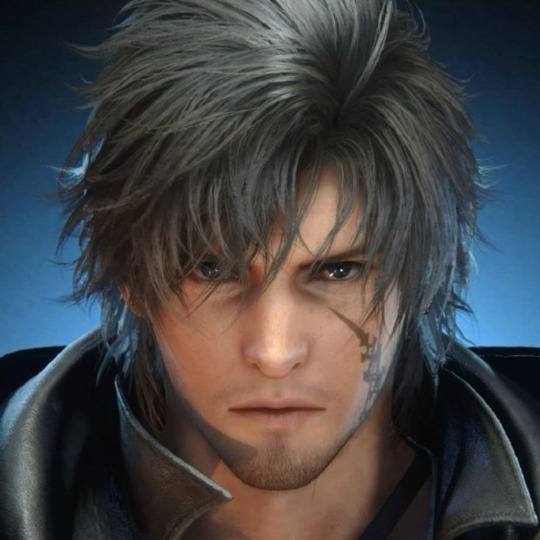
I'm no expert on all the titles in the Final Fantasy franchise so forgive me if I'm off about any of this, but, as far as I've noticed, male Final Fantasy protagonists tend to share a similar appearance: young, clean-shaven, stylized features, spiky/over-styled hair with thin, and rather effeminate brows. Think of Cloud as the poster boy of this look. 20-year-old Noctis fits squarely into this category, making his leap outside of it due to a significant time skip (and design choices) an interesting one to examine as this has never been done with a mainline male Final Fantasy protagonist before.
On the other end of the spectrum, we have the latest protagonist, Clive (a character who also aged significantly in his game and ends up at 33), who stands out as a unique addition to this roster with his more obvious masculinity as depicted by his larger build and facial hair. Though still stylized to a degree in its own way, Clive and the direction of Final Fantasy 16 as a whole trend more realistic for the most part, avoiding the more typical stylization choices of previous titles and striking a new direction into more Western appealing territory as was the intention, but though he embodies these qualities to a more notable degree, he certainly wasn't the first attempt.
With a foot in both worlds, Noctis bridges the spectrum with his younger self being more in line with past characters like Cloud, and his older self acting as a prototype to pave the way for a protagonist like Clive. Time will tell if this series continues to lean into this new style choice and feature older, more traditionally masculine men or if we'll return to the classic, more overtly stylized, 'pretty boy' formula for its male protagonists. Regardless, Noctis' bold leap in age and appearance will always stand as a notable choice that helped pave the way into new territory for the Final Fantasy franchise.
CONCLUSION
As we've explored, Noctis' appearance changes drastically after the 10-year time skip. From his eyes, brows, nose, ears, hair and even skin tone, every feature on his head has been altered to some degree with the exception of his untouched body. Did he need to change that much, though? Honestly, probably not. As I surmised, most but not all of these changes felt entirely necessary or even logical based on the foundation of what came before but, rather, felt like choices borne of a new adherence to realism over past stylization in the case of his eyes, nose and lips specifically and a desire to masculinize him as evidenced by his rugged new beard, strong jawline and thick brows - all elements of which result in turning him into one of the most realistic looking protagonists in the entire franchise, in my opinion, even if the journey to get there arguably pushes the boundaries of normal age progression at times.
This departure from what came before was certainly a bold choice and not one that worked for everyone as I've seen some lament that such a dramatic change coupled with a sudden timeskip made him no longer feel like the same character, but I'd argue that change is also the point. By the end of the game, Noctis has grown and transformed in all the ways he needed and that's the purpose of the entire story and therefore a necessary choice in telling it. The creative decisions behind the changes are, of course, debatable. I for one really love the alterations and think the creators were successful in aging Noctis in a mostly realistic way that visually embraced his inner king by outwardly reflecting his father and also offering audiences a taste of something revolutionary for the brand.
These are just my thoughts. What do you think about Noctis' change in appearance and which age do you prefer?
Thanks for reading, if you enjoyed this, please reblog and/or like and check out my #ffmeta and #ffedit tag for more!
#final fantasy#noctis lucis caelum#final fantasy xv#final fantasy 15#ffxv#clive rosfield#cloud strife#lightning farron#ignis scientia#gladiolus amicitia#prompto argentum#lunafreya nox fleuret#final fantasy xvi#final fantasy 16#ff15#regis lucis caelum#ff16#ffxvi#final fantasy 13#final fantasy xiii#ff xiii#ffmeta#ff xv#ff 15#ardyn izunia#ardyn lucis caelum
390 notes
·
View notes
Text
Not gonna lie, analysis of Minfilia that rests on a reading of her as some kind of hiring manager at a company really doesn't sit right with me, not just because it lends itself to some particularly uncharitable readings of Minfilia, but because it seems to me like a pretty inaccurate reading of what the Scions actually are in ARR.
The Scions of the Seventh Dawn are the union of the Circle of Knowing, a group of activist academics who accurately predicted the apocalypse but failed to prevent it and lost their beloved mentor in the process, and the Path of the Twelve, a group for Echo-bearers to help them better understand and make use of their gift--all doing their best to pick up the pieces and protect the realm in the wake of said apocalypse. Minfilia, formerly the leader of the Path of the Twelve, has now been thrust into the position of leadership over both at the late Louisoix's behest. The Scions in ARR aren't a company, they're an activist group, and in ARR still a very small one without the massive web of political connections they fall into later. They don't have a lot of financial resources. They're largely working quietly and behind the scenes. They have a secret code phrase to identify friends of the organization. Being recruited into this group in ARR is closer to being recruited into a resistance cell than being interviewed for a formal job.
Minfilia's role prior to the Calamity was as the leader of a support group for people experiencing a frightening, isolating, and as-yet poorly-understood phenomenon, a group where they could find others like them, understand what's happening to them, and learn how to use their gift for good. And to some extent, this is still a part of her role. The Warrior of Light is brought in because they were witnessed experiencing the Echo, and Minfilia is reaching out to them as a fellow Echo-bearer. I think it's a mistake to interpret her words and actions without that context, particularly her expressed hope that this most recent Echo-bearer she's invited into her group will find something like family there. I mean, listen to the joy with which she says, "I too possess the Echo." She's telling the WoL that they're not alone, that there is a name and an explanation for what they've been experiencing, that they can find others like themselves here. Yes, she's also asking for their help. But this is a pretty far cry from a job interview. However flawed the Scions may be as an organization, I can only see Minfilia's overtures here as offered in the spirit of friendship and camaraderie. And framing that as her trying to build loyalty she can exploit in a corporate manner feels extremely ungenerous given what we know of her character.
I don't want to sound like I'm here to defend the Scions in ARR against any and all criticism--I've discussed my own in the past, from their concerning tendency toward self-sacrifice to the attitude they develop toward the WoL (which is kind of up for interpretation based on your character's relationship to them but which can come across as a cavalier attitude toward the WoL's safety, taking advantage of their unique abilities, etc). In particular, the Scions' experience as a small activist organization, and Minfilia's particular experience as Echo support group leader, has ill-prepared any of them to be thrust into an international spotlight following the defeat of the Ultima Weapon. The attack on the Waking Sands has already revealed the weaknesses in their opsec, and certain scenes in the ARR patch quests reveal something of a power struggle between Minfilia and Alphinaud--one which Alphinaud ultimately wins, because Minfilia lacks the kind of confidence in her position to stand against the force of his personality, and she, like most of the other Scions, starts to fall into the trap of seeing Alphinaud as the second coming of Louisoix and lets him push her around accordingly. Minfilia is simply not equipped or prepared to lead the kind of organization the Scions are turning into. (Urianger, incidentally is one of the few who seems to notice this and remark on it, but also seems to feel that he can't directly object.) The cracks begin to show, and then it all falls apart, and when the Scions finally begin to put themselves back together post-Heavensward, I think they all understand that they can't go back, that what they rebuild will be something new. Over the next few expacs I think we see them developing a new group identity, recognizing that that old model no longer serves them and doing their best to adapt to constantly changing circumstances.
The Scions in ARR have plenty of problems, but they're not a for-profit company and they're also not the same organization as the Scions of later expacs. I think that context needs to be taken into account when interpreting their actions, especially those of their leader.
#sorry to vague#i just think interpreting everything through a capitalist lens maybe results in some less useful readings#afk by the aetheryte#ffxiv stuff#heavensward spoilers#arr spoilers
347 notes
·
View notes
Text
Writing a "Highly Sensitive" Character

Sensitivity - awareness of and responsiveness to the feelings of others; susceptibility to being easily hurt or offended
Highly sensitive people (HSPs) - often show heightened sensitivity to stimuli such as loud sounds, bright lights, or strong smells. They also tend to experience deep emotional reactions, empathy for others, and may need more time to recharge after social interactions or stimulating environments.
Traits of Sensitive People
HSPs have distinct traits that could be mistaken as symptoms but do not indicate a disorder. They can include the following (Aron, 2010):
HSPs feel everything deeply and more intensely than others, whether joy or sadness, pleasure, or pain.
HSPs' high sensitivity means they take great joy in the simple pleasures in life, making them low maintenance and easy to please.
Need a lot more downtime than others, thrive in silence, and need a slower pace of life. This means taking the time to relax and process experiences is essential for their wellbeing.
Take longer to make decisions than others due to the depth of information processing involved, including conducting a thorough risk assessment and proceeding with caution.
Change can pose problems for HSPs. Even positive change may result in high levels of excitement and anxiety simultaneously due to the overstimulation caused by new experiences.
Can find handling conflict and criticism challenging, as they tend to have very high expectations of themselves and are hard on themselves when falling short. Others’ additional criticism can feel overwhelming.
Tend to have a rich inner life, being more self-aware, creative, and insightful than less sensitive people. This is likely to draw them into exploring a spiritual path in life, especially contemplative practices like meditation. They also enjoy a deep appreciation of the arts such as painting, dance, and music.
Tend to avoid the negative overarousal caused by violent films and news coverage, which almost hurts them physically.
HSPs' vulnerability to overstimulation can lead to a tendency to withdraw in new or tense situations. This can lead to them being seen as shy or unsociable when many are extroverts who just need extra time alone to process things.
Prefer a small social circle full of love and support, which they return in abundance due to their high levels of empathy. Letting another person in takes time, but when an HSP becomes your friend, they are loyal and supportive through thick and thin.
A highly sensitive person is someone who processes sensory input and emotions more deeply than the average person. This heightened awareness makes them more reactive to both external stimuli and emotional experiences.
This is a trait characterized by sensory processing sensitivity (SPS), which identifies a highly sensitive person/personality (HSP).
The term HSP was first coined by the psychologist Elaine Aron (1996), who is herself an HSP. She and her husband devised the Highly Sensitive Person Scale (HSPS), which spawned further research into the trait, including its neurobiological origins (Aron & Aron, 1997).
Before that, Carl Jung was the first to recognize the importance of sensitivity and believed that it played a more important role than sexuality in an individual’s susceptibility to neurosis (Aron, 2004).
The terms HSP and SPS are often used interchangeably. In later research, Aron (2010) differentiated the HSP trait into 4 categories.
Depth of processing. HSPs process all types of information more deeply than others, are more reflective, and take longer to make decisions (Aron, 2010). Depth of processing occurs both consciously, through analysis of information conveyed by communication in relationships, and unconsciously, through gut feelings or hunches.
Overarousability. HSPs notice a lot more than others in the same situation or environment, including other people’s emotions (although they may remain unexpressed), noise levels, smells, and other aspects of the environment (Aron, 2010). This can be advantageous but can also lead to overarousal and chronic stress.
Emotional intensity or empathy. HSPs experience strong positive and negative emotions in response to a range of pleasurable and painful stimuli (Aron, 2010). This increases their sensitivity to others’ feelings, making them very empathetic.
Sensory sensitivity. HSPs notice subtle environmental stimuli that other people miss. This can help protect them and others in their social group from unforeseen dangers but can also lead to problematic levels of sensitivity to foods, medicines, pain, noise, and light (Aron & Aron, 1997).
The combined effects of the trait result in empathic, conscientious, cautious individuals, who may also be sensation seeking and relish novelty (Aron, 2010).
There is no correlation between the HSP trait and extroversion or introversion (Aron, 2010). However, an HSP will always carefully evaluate the risks before proceeding with an adventure, as their sensitivity counters impulsivity (Aron, 2010). HSPs tend to plan ahead and are excellent strategists.
From an evolutionary perspective, HSPs may have an oracular function in social groups due to heightened intuition and sensitivity to environmental cues (Acevedo, Jagiellowicz, Aron, Marhenke, & Aron, 2017). Highly sensitive members of around 100 animal species have been identified and often warn their group of dangers undetected by others, helping to keep them safe (Aron, Aron, & Jagiellowicz, 2012).
The HSP trait is not aligned with giftedness, which comprises only 3% of the population (Aron, 1996). However, research conducted by psychologist Elke van Hoof found that 87% of gifted people are highly sensitive (Koolhof, 2020).
HSPs also have a heightened aesthetic sense, being highly sensitive to beauty in nature and the arts (Aron, 2010).
HSPs are also more disturbed by ugly or coarse stimuli than less sensitive people and avoid violent action films and news coverage (Aron, 2010). They are also more likely to have vivid dreams and have a rich inner life (Aron, 1996).
While HSPs are more distressed by negative environments than less sensitive people, they also benefit more from positive, supportive, and nurturing environments (Aron, 2010). This is especially true during childhood, but HSPs also benefit greatly from counseling and psychotherapy to overcome childhood difficulties, leading to low self-esteem (Aron, 2002).
There are cultural differences in their experiences, too. HSPs are highly valued members of societies that value reserved, cautious behavior such as China, Japan, and Sweden, but less so in bolder, competitive cultures such as Anglo-American and some European societies (Ketay et al., 2007).
Smolewska, McCabe, and Woody (2006) conducted a factor analysis of the HSPS and found it comprises 3 distinct factors:
Awareness of aesthetics (AES)
Low sensory threshold (LST)
Ease of excitation (EOE)
Further analysis from Smolewska et al. (2006) found that higher AES indicators bestow more positive outcomes of the trait, including a more intense perception of subtleties and empathy, while higher LST and EOE scores tend to indicate more neurotic outcomes, such as anxiety, social withdrawal, hypervigilance, and overarousal.
Sources: 1 2 ⚜ More: Writing Notes & References ⚜ Writing Resources PDFs
#writing notes#psychology#character development#writeblr#literature#writers on tumblr#writing reference#dark academia#spilled ink#writing prompt#creative writing#light academia#character building#writing inspiration#writing ideas#giovanni boldini#writing resources
287 notes
·
View notes
Text
i'm just gonna call it that we need to practice mindful tech usage and security and i don't mean screentime tracking apps and vpns or whatever i mean starting from early childhood and going into adult wellbeing culture to encourage tactile hobbies and long-form work and the understanding of online devices as commodifying the user with spyware
i'm talking throwback word processors with the same ergonomics as regular smart devices for general educational work and dedicated subjects for working with digital technologies so you have theory in practice and then applying that theory in a contemporary work context. that's where you learn applications, digital safety, and how to implement the generative tools. separately. once you've already developed the critical analysis and expressive skills first.
i have been basically addicted to the internet since i was 13, i've had ups and downs with it, but i've always had a little bit of over caution when it comes to information and identity online. i overshare what i chose to but i think the break down of privacy as a norm when it comes to personal data tracking is genuinely awful.
i like algorithms in some places but i do not think this super-customisation is worth this panopticon of tech.
have you heard about how phone locations can still be triangulated when the phone is off? this is incidentally why if you are gong to protests and you think you are in danger it might be best to leave it at home. but generally if you want to avoid audio and video being used to build a marketing profile you can just switch it off and pop it in a bag or the next room. but with fb trying to make voice command smart glasses a thing (after snapchat and google both failed to sustain the same product) it bears caution that so called wearable tech such as glasses, pendants, watches, earbuds, ect.... even outside of smart cars there's the risk of passive listening for user marketing profiles. we already have location based advertising, ads that track your useage to predict your menstrual cycle or life events, public ads that react to nearby phones
i am going off on this tangent to say that i am not naïve to the fact that we already have to constantly dig into 'dark patterns' of settings to opt out of surveillance and commodification. i'm aware that the easiest path is to do nothing and use the shortcut machines even when they don't actually help or save much time or effort beyond selling you tools that already exist with a new price tag. i'm aware that the plagiarism software with no idea what it's talking about and runs on resource wasting pollution and underpaid remote human labour that also gets slapped in every function role despite basically being fancy autofil and pixel pulp not only has all of those issues but the lay person is either unaware or does not care and companies only care that it is a new way to pretend they're innovating. i know all this just like i know that mass automation is just exploitation unless it is balanced with social structures for all that mean emancipation from the need for labour.
but while i think all tech can be used for good, facilitating human connection across physical distance, carefully trained data analysis on a rapid large scale, removing the tedium of technical drudgery where needed, just providing light entertainment. but we have gotta be better about legislating, moderating, and use culture.
use culture goes hand in hand with convenience. it's why vinyl records are still trendy, not only are they good at what they do, but there is enough cool factor that the inconvenience becomes a feature. CDs are also convenient still! but CDs do not have the cool factor so they get wiped out by the convenience of streaming. playlists in streaming have a cool factor that radio does not despite radio still being convenient. and remember no matter how much streaming claims you can pay to opt out of ads that's usually something that you get payment tiered out of eventually so the convenience facilitated by accessibility is debatable the longer time passes.
looping back to my original point, if we can encourage an understanding of digital privacy as something you shouldn't be complacent about, that you shouldn't have to pay for tools to get out of the spotlight, that it is immensely embarrassing to be too into exploitation by tech companies and make that the problem of everyone around you. user control should be synonymous with convenience. customisability/personalisation through individual control rather than passive scraping. you can still commodify decorative tech.
we gotta make slop and babying algorithm brained tech usage cringe. people don't care to hear that it's immoral so just make them feel uncool at this point. because it is embarrassing that you have the universe of resources at your fingertips and you're too scared to do anything with it other than beg it to put words in your mouth. who cares if you're chronically online or too busy irl to learn a new skill. you are like a little bird pecking at it's own reflection, that's sad. try saying something mediocre and honest. we gotta stop tap dancing into technofeudalism just because we're too complacent to actually talk to each-other.
#ranting again#sorry i've been a bit of a doomer lately i simply know too many things about tech trends against my will
118 notes
·
View notes
Text
I'm not sure I know quite how to word this yet, but I feel like part of the issue with people's perceptions of the Jedi and the Order is that there are some aspects of it that are intended to be applicable to real life because they're part of the overall themes and messages of the story, and there are other parts that are straight up fantasy tropes that are just there to give it a fantastical feel, and not everyone's sure which is which, so you get certain things being criticized that are just basic fantasy trope and other things being tossed aside as just fantasy bullshit that is meant to be viewed as part of the running theme of the entire story.
For example, the Jedi taking in children very young is often something that gets criticized and while there have been people trying to explain this in-universe as a necessary thing to help these kids grow up with certain values and make their lives as Jedi easier in the long run, it's going to be something that's far easier to swallow if you just realize it's a straight up fantasy trope. The kids are magical, there's a force in the universe calling them to take up a specific path so they can fulfill a destiny. That's it. These kids know, at extremely young ages, that they're destined for something greater and can follow that path and call older magical beings to help guide them down that path. It's just fantasy, y'all, it's not meant to be any deeper than that.
Whereas on the other hand, the attachment rule sometimes gets explained away as something that's necessary for the Jedi because they're space wizards with special powers that are connected to their emotions and so the Jedi NEED to manage attachments in a way no one else does specifically due to their abilities. But in reality, attachments and their consequences are part of the overall theme of the entire franchise, specifically of Anakin's storyline. You as the audience are meant to look at Anakin's story and realize that attachments are in fact actually bad and while you may not end up murdering a bunch of children as a result of your own attachments, it's probably still worth figuring out how to control your fear and let some shit go and accept that sometimes people die and it's sad but it's just how life goes sometimes. The attachment rule isn't important to the Jedi because they have space wizard powers, it's important to them because it's just genuinely important for EVERYONE. This isn't a fantasy trope, this is a storytelling trope that is often at the core of a LOT of different stories you know because it's a really really basic message to send about how to live your life in a healthy way.
But, yeah, I think it would help some people to have a better understanding of where in Star Wars, especially with regards to the Jedi, it is helpful to apply rules of the fantasy genre and where to apply more realistic analysis because it's something that's meant to be applicable to the audience as the lesson they take away from the story.
133 notes
·
View notes
Text
I've been thinking a lot today about how easily people condemn Solas for making the choices he did or for so regularly refusing the help and love his friends or a romanced Lavellan extended to him and how that's a very easy thing to do from behind a screen in a fictional game where you are able to (with very few exceptions) curate a world in which your allies are loyal and your decisions will go the way you'd like them to.
And yeah, it's a game and that's kind of the point, but if I were to look at it a little more deeply (and who am I kidding, I got back on this website exclusively to process the aftermath of Veilguard) I'd say that there's so much to be found in wondering if the protagonists in any of the other games would have fared better in similar conditions.
Apparently I can't stop making long posts, so buckle in.
What would Morrigan have become in a world where the Warden never stumbled upon her cottage with Flemeth, if she never got the chance to see more of the world and decide what she wanted out of it? With just her mother (who, coincidentally in this Solas-y discussion is also kind of Mythal) and no support, who is to say what she would have unleashed upon the Korcari Wilds one day when the confines of her cage became too much?
What about Leliana? She, too, suffered at the hands of a very controlling abuser who tried to convince her that one lifestyle was all that her future held. What do we think she would have become if not for a chance meeting in Lothering with someone who could help her face down the woman that molded her?
Fenris, a character MANY people are just fine with was incredibly ready to kill a mage on sight if need be, no questions asked. Where do we think his story goes if he doesn't have someone in his corner early on enough in the game? If he doesn't get caught by Danarius, he's almost certainly going to end up on a murder spree, and he doesn't even have Justice whispering in his head to do it.
Cullen. Just all of him. It's an absolute miracle he hasn't snapped by the time you encounter him in Inquistion, and even then you get the benefit of intervening at a critical point in his story several times over.
Almost every other character could face this analysis and I think we'd reach a result that suggests perhaps the only thing keeping them lovable is your playable character's investment in their well-being.
Enter Solas. We don't meet him when he's twenty to thirty something and on the precipice of falling down a dark path. He's been there for literal millennia already, and with the exception of one close friend he's been alone. And not even Felassan is enough because of the years Mythal had prior to that friendship to make Solas exactly who she needed him to be.
I've had shit friends before that aren't just good at isolating people, they're naturals. I barely made it through high school with my mental health in place (in fact, looking back, it almost certainly wasn't). When you think you've got a true friend and they need something of you, it's so easy to blindly follow them because you think your love is enough to mark someone's soul as trustworthy. Solas doesn't learn that lesson until it's too late, and even when he does he can't turn back: the spirit that was once Wisdom has been exposed to several of the worst ancient elves to ever exist and now he has to stand his ground rather than let it all fall, because that is what Pride would dictate. Admitting that the person you gave your love and labor and time to is a monster is hard. And he was alone.
Give me Morrigan after centuries with her mother. Show me Leliana after the years have become a blur and the only voice whispering in her ear is Marjolaine's. Show me the innocent mages that don't make it through if all Fenris has for years and years and years are the scars Danaris left him and the means to make more. Show me Cullen if he stays in a chain of command under a Knight Commander who knows exactly what he fears and holds it over his head for so long he forgets what it was like to be an excited kid begging the templars for training because he just wants to keep people safe.
We get companions in these games who are broken by the time they're twenty. Solas has spent thousands of years in servitude to a cause of a woman he believed to be his only friend. He doesn't know who he is without her influence, anymore, only exists physically in the first place because she asked it of him and then asked again and again and again. He doesn't have a witty band of merry fools to pull him out of that cycle. He has Felassan, but he has him during war after war after war in the hopes of freeing others from the very situation that torments him.
Trauma from war affects everyone touched by it, nevermind the fact that Solas is actively responsible for saving the lives of thousands and feels each life like a weight around his neck because maybe he can save them like he cannot save himself. We should always be worried about the people trying to do the most good. Who is looking out for them? Why are they so determined to help others? Could it be that it's something they wish others had done for them?
Solas certainly feels comradery with Felassan from working together to free slaves from the very people he helped put in power because Mythal told him it would be okay only to leave him with the pieces, but even the Solas that Felassan knows has been turned into an attack dog shying away from the touch of the very person it desires to be near above all others by the time their relationship forms.
The fact that Solas is able to try and show the Inquisitor who he is at all is a miracle as far as I'm concerned, a sign of a peaceful spirit of Wisdom who loves knowledge for the sake of it finally sensing that there might be a chance to embrace its nature again.
Yeah, if you give him what he has come to expect from people with power, if you let near-absolute power over the masses corrupt you, he's going to bristle and try to shut your inquisitor down.
But if you show him even the smallest bit of kindness? If you treat him like the starving wolf he talks about and feed him instead of fighting him? God, it shatters his entire existence.
It's called a cycle of abuse for a reason. Finding friendship, finding the love of your long-ass life can be the first step in realizing there's better out there. But the time it takes to learn that? When you're too weary to even reach out for help in the first place and afraid of every kind word or gesture because you've never known such tenderness (on a platonic OR romantic level, both matter so so much) before?
Part of the compelling tragedy of Solas is that it's almost Orpheus-like how he knows what he has been made into and still cannot stop himself from yearning for more, from turning around to see if just this once something has changed. You can't convince me that he hasn't spent years hoping that someone will hear the legend of the Dread Wolf and see it for what it is, a leash the Evanuris created for Mythal's whipping boy to ensure that even if he ever escapes them, the people he fought to save will hate him. And I cannot blame him for the shock and terror that consumes him when he realizes someone finally has.
You give me any of dragon age companions after the amount of time Solas spent under Mythal's thumb without your character's intervention and you tell me how that looks.
You tell me if they're able to change at the first sign of something that feels too good to be true.
And then, I want you to tell me they're any less worthy of trying to save, especially when you know how good their best can be.
Solas might be hard for some fans to love, but it's only because he serves as the perfect representation of the beast we are all capable of becoming when the love that sustains us, assuming we receive any at all, is laced with poison.
The journey out of that place, out of a literal prison of regret, is brutal, and I'm thrilled that even with the many things about Veilguard I'm still struggling with, we have the chance to let Solas try again with the help of those who love him not because he never fell down, but because they believe in the beauty of a future where he gets back up again.
#solas#solas meta#solas spoilers#dragon age#dragon age the veilguard#solavellan#morrigan#lavellan#datv spoilers#datv#dragon age the veilguard spoilers#mythal#felassan#dragon age spoilers#dragon age meta#veilguard#fenris#cullen#leliana#varric#varric tethras
385 notes
·
View notes
Text
the problem with mitsi (or as i like to call it. mitsogyny)
(context: this was written under a youtube video, which i'm sure most of us have at least seen pop up in our recommendeds, in response to many people taking criticism against the new episode. it has been edited a little to be more cohesive as a somewhat-essay)
ok, i wanted to write out a rant/essay/ramble/whatever sort of summarising the criticism against mitsi's plotline because a lot of the people here seem to be misunderstanding the fundamental issue that people have with it, including some of those people themselves.
first off, an analysis that i think tell both sides of the argument very well which i feel should be read before reading the essay: Mitsi: What Makes A Fridged Character (and why y'all are wrong about it) | an AvA essay by InksandPensblog. i will note: i don't care to discuss whether mitsi was fridged or not and that won't be of much importance in this post. the above link gives some insight into some of the fandom's criticism of mitsi and how she was "fridged", defining common tropes for examples. that's what's relevant to this post.
the main issue with mitsi, in my opinion, is less with the fact that mitsi's a girl and moreso the fact that she's one of the only female-coded character in the series, and that her character's main purpose was to further victim's own development. the other arguably female-coded character in the series is pink, who (like navy) only really exists to explain purple's motivations. i don't have much of an issue with that since they're not meant to be important or sympathised with at all. that's not their job in the story.
with mitsi, i've seen people point out that she has more character to her than just victim's love interest and supporter: she invents rocketcorp, she's smart, she's kind, innocent and helpful. narratively speaking, she shows other creations' relationships with their animators, parallels her innocence with victim's trauma, and introduces victim to the outernet (as most fans call the stick realm).
but most of this things imo are either stretches or invalid arguments. she's not really a 2/3-dimensional character in any way; her main character traits boil down to the fact that she likes to be in service of others with no nuance behind why she likes helping people. she hypes up victim for the villagers, she starts a company with him to share his talents with the world, and she helps him overcome his trauma from alan's torture. all of her main plot beats center around victim: and while technically the sticks are genderless and free to be interpreted however the viewer wants, alan and most of his team see all the main characters as male, and that subconciously affects how they're written. mitsi, the first major female-coded character, spends most of her storyline in service of victim, a character not written as female.
there's also the issue of her being victim's canonical love interest. i feel like this statement from alan is important to keep in mind (don't mind the sound effects and edits, this is the only isolated clip i can find at the moment). in particular:
"i just assume that [the ava/m characters] are just a bunch of bros]. i haven't thought of adding any female stick figures but i think it'd be good. i don't want to introduce any romance though, i don't want that to be a theme."
he seems to have changed his mind on that last part, which is fine, but the notable part for me is that he seems to associate female characters with romance from the getgo. before anyone misinterprets this, i'm not trying to call alan sexist or anything. but there's a common issue with women in stories being reduced to just a romantic partner for the male lead, and mitsi falls under this, with her entire character existing to serve victim. (not to mention people will make things about romance whether you like it or not. that's just basic fandom. search up grapeduo or chodark.) even her death is to put victim on the path of vengeance--- it doesn't need to happen to show the extent of tco and tdl's destruction, because that's already made pretty clear in ava s2 the flashback and the earlier scenes showing various characters escaping burning buildings. when you write a female-coded character whose only purpose is to serve a male character, you're contributing to sexist narratives.
a counter i see many people point out with the idea that she has no character is that she does have character traits, it's just that they're generic ones like "kind" and "innocent". the issue is that she has no flaws to counterpoint this; it's not that she didn't have enough screentime. in ava4 for example, we see tsc's flaws pretty clearly; they can be very mean when they want to, they're petty (albeit for a fair reason), they're a little impulsive. this is shown in 11 minutes (from the moment they come alive to the end of the video).
with mitsi meanwhile… she doesn't seem to have any flaws? she helps victim whenever she can. she's nice to all the villagers. her customers all like her and she's a great leader at rocket corp (to note, specifically as part of a pair with victim. they're a power couple, she's barely given credit for her work alone). she has 13 minutes of screentime, or 10 if you count from her waking up in the outernet. there's plenty of opportunities to show her having flaws; maybe she acts a little selfish during tdl and tco's attack, only wanting to help herself and agent smith, or maybe she overworks herself, or feels awkward at having too much attention (and that could also be why she redirects so much attention to victim, she's shy). you could argue that the episode needs to develop victim and agent smith too, but ava4 shows that's easy to do too: just a few seconds dedicated to showing rgyb fighting over who leaves first shows that they can be selfish and childish. it's very easy to insert a moment like that for mitsi.
it's a little disappointing when the first major female-coded character in ava is completely flawless, with no personality outside of being nice and helpful for others.
also, slightly unrelated, check out this quote from mitsi's plushie website: "her white featureless face seems to ooze mystery and feminine power all at the same time." her main character trait, as a woman, is being feminine. it's irritating as someone who's been raised a woman to see her reduced to just her gender. she feels more plastic than a person, like the concept of what a woman should be (perfect, kind, useful) and not an actual character/person.
i would expect more from the writing in the series seeing as it's not just an independent passion project anymore, and has multiple writers that all could've worked to flesh out mitsi, or at least get a sensitivity reader of sorts to point these issues out. it's extremely disappointing and i can understand why people were upset.
tldr: the problem isn't just that mitsi's a girl, or that she's nice or dating victim, it's that she's written in a misogynistic way.
#alan becker#animation vs animator#animation vs minecraft#ava mitsi#ava victim#avm mitsi#theo's rambles#ava vitsi#ava vicsi#victim x mitsi#animator vs animation#ava ships#avm ships#ava agent smith
269 notes
·
View notes
Text
Caine Is Gonna CRASH OUT theory Part I: Tech Analysis
“The worst thing you can do in this world is make someone feel like they’re not wanted. Or loved.”
So Caine has obviously been glitching since episode one, and I have some concerns. I love this manic denture man. I can't. But I’m scared for him, because it’s not clear right now where his development will go, but there’s two most probable paths ahead, and both are devastating.

It must be said: Caine has to face being told how much his hard work sucks. Every. Single. Day. Overtime that would wear down anyone’s self-esteem regardless of how much of their identity was invested in that. However, creating adventures is the lynchpin of Caine’s identity. The bulk of his programming. Therefore, not only does the constant negative criticism hurt, it’s destabilizing his identity. This is extremely dangerous, as Zooble well knows. Whereas if a member abstracts, it only physically affects them. However, we know that if Caine abstracts, this would destroy the whole circus.
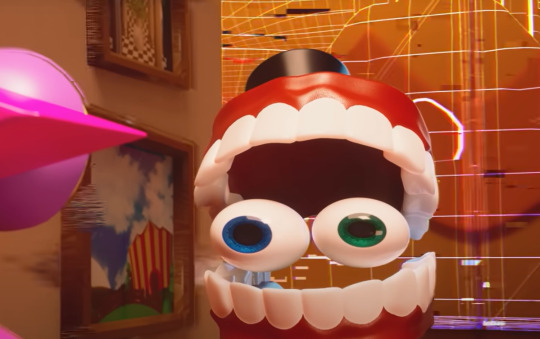
Another contributing factor to his glitching is how much software he’s running at any given time. First he’s constantly maintaining the circus and its outside locations. It might seem small when we zoom out, but it’s actually extremely large, probably many times larger than the average house considering how many rooms are in the circus tent alone. Secondly, he’s making new adventures daily. Despite reusing assets, this still takes a lot of bytes, surely. Just look at how he reacts when Zooble suggests he leaves different adventures open so they can explore at their whim:
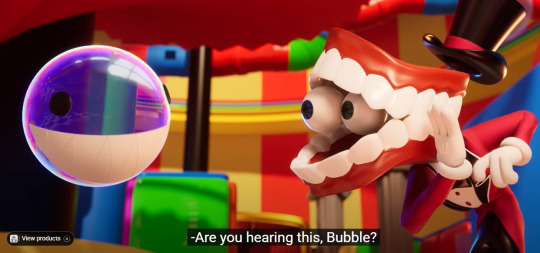
I know folks found this reaction strange, but it was a perfectly rational reaction. In fact, any other reaction would have been strange. Of course, I own a computer that can’t even run the Sims 3 properly, so it’s been obvious to me for a while that the old-style computer the circus runs on has many physical limitations. It’s already running more software than even a modern computer can run, which, while impressive, will start to cause hardware issues as it burns out.
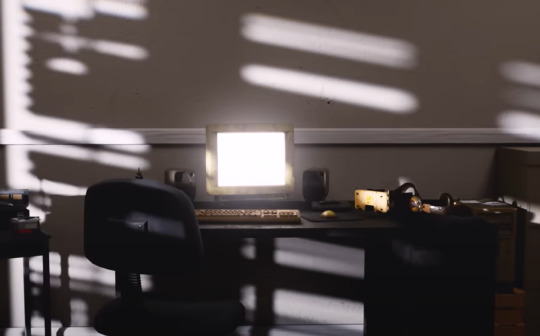
Don’t forget his many “all-seeing eyes” which I believe he doesn’t have access to all of them at once considering he seems genuinely shocked and worried when he sees Pomni ventured into the void. (After which he returns her without even scolding her.)
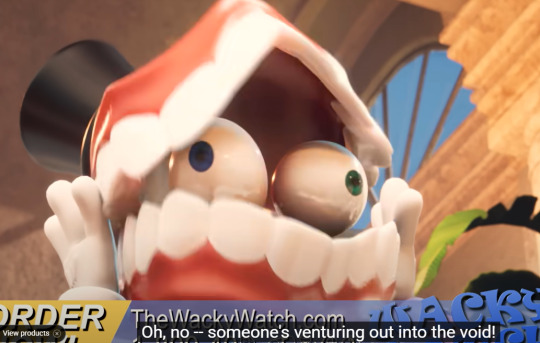
And don’t forget he sent half the members to retrieve Kaufmo, which I sorta doubt he would have done had he been paying attention to him. Either that or he wanted them to see Kaufmo abstracted, but why would he do that? What purpose would that serve? I don’t buy that he knew. I think he lied or exaggerated his ability to observe the whole circus, under some impression this would keep everyone feeling safe, and not understanding how creepy that sounds.
Let’s explore another idea: What would happen if the computer suddenly crashed or loses its ability to run completely? Now, I don’t believe that will actually happen in this run of the series, but it’s interesting to ponder upon especially in regard to Caine who is solely limited to what the computer will do.
To conclude this part, I think a combination of not being able to fulfill his purpose and hardware issues will lead to the storm Gooseworx was talking about. Maybe not in the next episode, but definitely during the last couple. That is if my theory is correct, but I’m open to criticism and unlike Caine, I’m able to apply it.
(part 2 soon)
#the amazing digital circus#CATtheories#pomni#caine#zooble#jax#tadc#gangle#kaufmo#bubbles#theory#filmtheory#analysis
60 notes
·
View notes
Text
sea bunny plushies and random tarot messages

( ( i had to take some time off because life was being too exhausting but now i'm back with my pac readings, missed tumblr so much tbh. ) )
so: pick a sea bunny plushie and let's see what random pieces of advice you can get from the tarot.
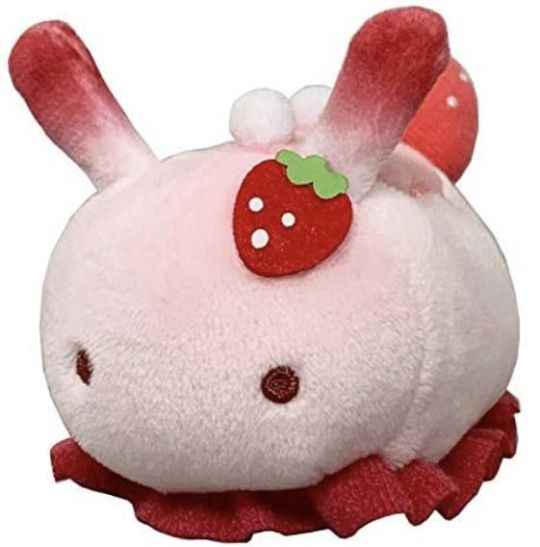
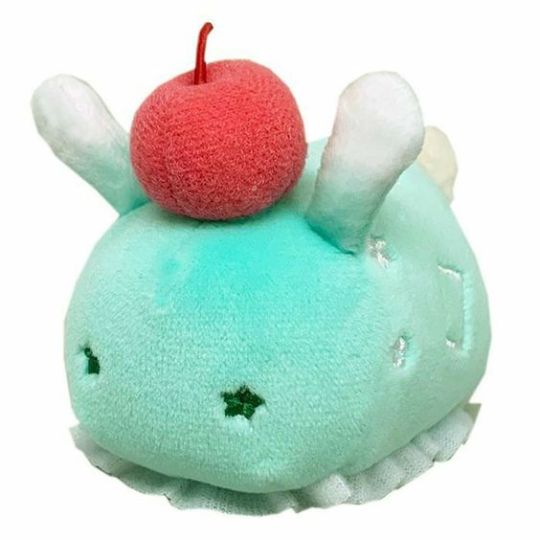

number 1 number 2 number 3
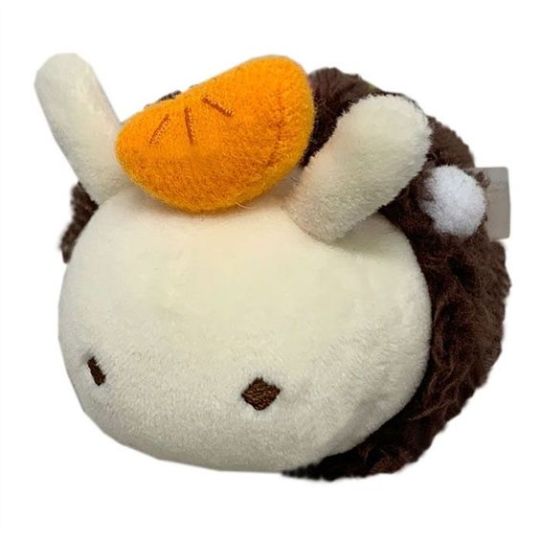
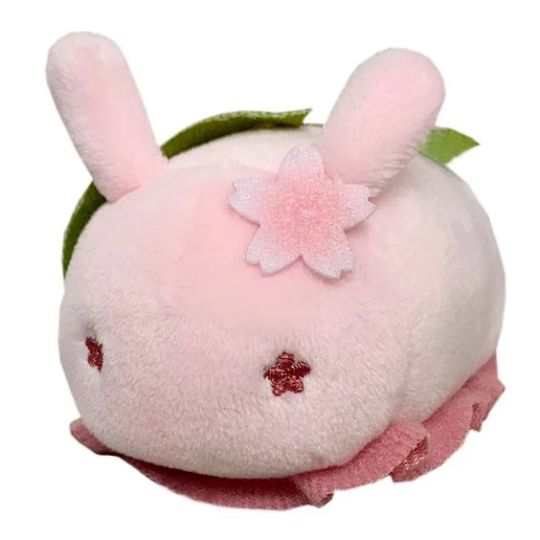
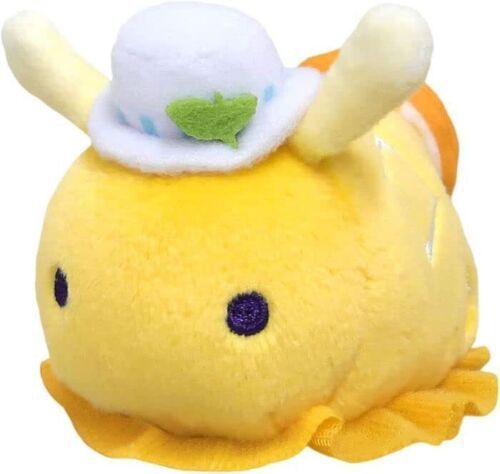
number 4 number 5 number 6

꒰ঌ ✦ scroll down for the results ໒꒱ ༘*.゚
-ˋˏ ༻ ❁ Masterpost and Tarot Menu ❁༺ ˎˊ-
images are from pinterest and dividers are by @nicodefresas
reblog if you enjoyed this reading or if you enjoy sea bunny plushies <3
༘⋆♡⸝⸝💌⊹。°˖➴

꒰ BUNNY NUMBER ONE ꒱ؘ ࿐ ࿔*:・゚
Being overly confident and reliant on thoughts that don’t come from healthy spaces is understandable if you’re in a desperate rush to find stability in your life. But sometimes these ideas will make you unable to move further, especially if moving on involves the questioning of such toxic beliefs. It is quite normal to find comfort in what we already know, but just because something is normalized (on the outside world or on your inner world) it doesn’t mean it’s healthy, or that it’s actually genuine to you. Even if your ambitions are coherent, take time to reflect on how you understand and conceptualize your own struggle and your path to success.
꒰ BUNNY NUMBER TWO ꒱ؘ ࿐ ࿔*:・゚
Neglecting healthy conversations about your emotions for the sake of other’s comfort is definitely stunting the development of many unrelated matters, not recognizing the importance of preserving your mental and emotional stability, is taking a toll on other aspects of your life. You’re giving away too much of your energy to people and places that won’t make an effort to comprehend the real complexity and validity of your purest emotions. Even if you feel like you’ve recently been too emotional, that won’t be solved by dissociating yourself from something so human and natural as feelings are.
꒰ BUNNY NUMBER THREE ꒱ؘ ࿐ ࿔*:・゚
This is a great moment to understand that it’s okay if you are not entirely sure on what to do next with your life. Taking the time to rest or taking an entirely new direction is also part of your own life path. Don’t expect answers that will come from outside yourself, you will find more clarity if you focus on building your own spaces of comfort and growth with the resources and people you already have in your life. Don’t look for things that are not meant to find you yet, find the time to take care and nurture what���s already there for you to help you grow.
꒰ BUNNY NUMBER FOUR ꒱ؘ ࿐ ࿔*:・゚
Even if it is quite undesirable to be in situations where you have to embrace chaos and accept uncertainty, it is helpful to understand that uninterrupted stability eventually begins to feel like stagnation. Situations of conflict are necessary on time to time in order to test the value and strength of anything. It’s key to understand that what’s needed in moment’s of instability is not a toxic sense of optimism and hope, but more so an objective analysis of what can be done since the problem is giving an opportunity to fix what’s broken and check what could break next.
꒰ BUNNY NUMBER FIVE ꒱ؘ ࿐ ࿔*:・゚
Your decision taking abilities might be affected by a false sense of urgency on time to time. If your mind is moving too quickly and it seems like there’s only few options where you have to go all in, just know that it’s likely that you are not thinking completely straight. Being paralyzed and stuck on unhealthy thought patterns is keeping you away from seeing the full picture. The overly rationalized insecurities and negative self talk might be unperceivable due to it being incorporated as normal and healthy “self criticism”. Is not, and it’ll affect your life negatively.
꒰ BUNNY NUMBER SIX ꒱ؘ ࿐ ࿔*:・゚
It’s okay to embrace the simple pleasures in life and feel confident in material success, yet being overly fixated on this will take away many opportunities to develop a deeper perspective on many issues you might be wilfully ignoring. Don’t allow yourself to change your core beliefs in order to appease hedonistic needs, as this will bring you to periods of stagnation. Take the time to establish your priorities and keep them in mind whenever anything feels too good to be true, if you don’t care for your success, nobody else will.

Hey hiii, it's me, Gigi. I hope you enjoyed this reading and you found something helpful or entertaining on it. In all honesty, im so so soo obsessed with those plushies like, i couldn't resist the urge to use them as visuals for this post i dont care how unserious it seems.
anyways, i'm back to being cronically online, my bookings are open so check my tarot menu if you're interested. and my masterpost has all my pac readings so far if you're into them.
if you feel like reblogging and liking this post, i appreciate the shit out of that and i love you.
i think i don't have much else to say, other than hi im back, missed this place so much.
so,,, bye <3 much love, gigi.
#tarot blog#tarotblr#free tarot#tarot#tarotonline#tarotscope#daily tarot#pick a card#pick a picture#pick a card reading#tarot cards#tarot deck#tarot journal#tarot services#tarot art#tarot witch#tarot reading#tarot community#tarot reader#pick one#pick a pile#pac reading#pac tarot#love tarot reading#self love#self care#tarot commissions#tarot course#tarot tips#tarot spreads
308 notes
·
View notes
Text
An Analysis of Beetee, Wiress, and Ampert in SotR
There’s something I have to get off my chest, and that’s the handling of Beetee, Wiress, and Ampert on Sunrise on the Reaping. This critical analysis is rather long, and you can feel free to skip it if you don’t care for critical commentary on a book you’ve really enjoyed. If you are interested, read on.
[Critical analysis, and spoilers, of Sunrise on the Reaping under the cut.]
Wiress
To save some space in this post, I’ll start by linking an essay I posted on AO3, titled An Analysis on the Missed Opportunity of Wiress's Moral Complexity in Sunrise on the Reaping. In this essay I analyze, and lament, the flattening of moral nuance in the portrayal of Wiress and her Games in SotR.
Beetee
Beetee’s storyline felt like one of the biggest loose threads in the whole narrative of Sunrise on the Reaping. I don’t think the retcon bothers most readers, because it’s a background element and it moves the plot along. But for me, it’s one of the most glaring, and one that I wish Collins had taken better care to craft.
We understand that the narrative needed to bring the District 3 rebels and Haymitch together. Providing Beetee with a traumatic backstory that rivals Haymitch’s is a bonus. But there are so many subtler ways this could have been thoughtfully accomplished.
The notion of a victor’s son being reaped has precedent, as Katniss mentions:
Victors’ children have been in the ring before. It always causes a lot of excitement and generates talk about how the odds are not in that family’s favor. But it happens too frequently to just be about odds.
So, it turns out Beetee is one of those unlucky victors, a fact that most certainly should have been mentioned in Catching Fire or Mockingjay and pointedly was not. Why?
Because it hadn’t been invented yet.
Getting Beetee and Haymitch together
We don’t know much about Beetee’s backstory, and from a narrative perspective it makes just as much sense to reap his son as anyone else’s, given that of all the mentors he’s the one most likely to possess knowledge of the structure of the arena and how it operates. But it also does something else: it gives him, a mentor from another district, the chance to cross paths with Haymitch and hash out the arena plan when he would have had no realistic pathway for doing so otherwise. We’ve got Wiress stationed as Haymitch’s mentor on one end for such things as knocking out the power for Rebel Talk, but there must be a reason for Beetee, one of the masters behind the plan, to gain access to a District 12 tribute, and what better way than putting him on the training room floor as punishment?
We have to accept that the demands of the narrative entail that Beetee needed a plausible avenue to speak with Haymitch, and a plausible motivation to destroy the arena, since Haymitch could not have accomplished this task on his own. What I can’t swallow is how it was rolled out to us.
“And no doubt you’re wondering why I’m here, Haymitch.” Beetee removes his glasses and polishes them on his shirt. “It’s because I’m being punished for coming up with a plan to sabotage the Capitol’s communication system. I’m too valuable to kill, but my son is disposable.”
We remember from Mockingjay that he “redesigned the underground network that transmits all the programming” years after this takes place, making this a throwback of sorts, but it raises too many questions. After he had demonstrated the intention and capability of sabotaging such an important piece of infrastructure, why would the Capitol allow him to continue working on such projects afterwards? Why would they allow such unmitigated access to their tech, designs, and infrastructure after what he had done?
We’re supposed to understand that he’s the Only Genius in Panem (he’s not; the Capitol has loads of brilliant scientists working on tech, communications, development, etc.) and that he has megawatt plot armor (the book refers to this over and over as he’s “too valuable to kill”). Most importantly, he’s alive by Catching Fire, so we know they don’t kill him. But the fact that he continued to do his work for the Capitol and was able to successfully rebel years later suggests that he has no history of treason. The trust they have in this man is astounding, especially because, as the book beats us over the head with, we know “how Snow works.” If his redesign of the underground network was an act for the rebels that we’re learning had failed in this past attempt, it’s even more inconceivable that the Capitol would have allowed him continued access and trust given that he had already committed treason. And not once, but twice by SotR’s end.
“I’m too valuable to kill, but my son is disposable.”
This feels like a blunt instrument hammering the obvious to the reader in a not very satisfying way. Yes, your son is disposable. So why take the risk of putting him in danger? It strains plausibility that Beetee ever would have.
In other words, it’s another example of how SotR is stitched together with the original trilogy in ways that make sense on the surface but not under the hood. Of course the brains behind the 75th arena breakout would have attempted something like this before, and had good cause to try. And I think we can accept that without much issue. What I cannot buy is how someone who knew the risks of what he was attempting, and knew the stakes in no uncertain terms, would be willing to do what he did with a son who’s just reached reaping age. How convenient. (Are we to assume his communications breach had been going on for a while and that they waited until Ampert was 12 to dole out the punishment?)
Besides giving Beetee parallel trauma to later-Haymitch and emphasizing Snow’s cruelty, which did not need further emphasis, the purpose of this was to place Beetee in Haymitch’s path. In other words, it’s contrived, and it does not respect the deep intelligence of the man that has been saddled with being the Tech Expert Archetype ™ in the story.

"At the time, I was just thinking of the science of it all."
I know it’s not fair to hold the books to something stated in the movies, but all the same, the sentiment remains. This line now makes no sense, because the science of this particular project would have had a different gravity to it considering it earned his son a reaping. And if he’d been involved in treason that had rendered such painful consequences all this time, the archetype of the scientist getting caught up in their work before realizing what they’ve brought into being is a little less believable, because he definitely should have understood the stakes at this point.
Crouching Rebel Hidden Family
I think the whole scene in the training room would have made more sense if Beetee had been subtle about what he was getting punished for, and without telling (expositing, info-dumping-real-quick) everything we need to know about WHY he was there. Haymitch doesn’t need to know. Hell, Beetee probably doesn’t know the Capitol’s intentions, entirely. And we don’t really need a callback to his redesign of the underground network/communication system hacking. It could have been anything else, and it would have made perfect sense. The point is that Beetee was doing something he wasn’t supposed to be doing, and Ampert was a warning. Not a full takedown, just a warning.
Perhaps it could have gone something like:
“Hello, Haymitch.”
“Hello,” I say.
“Impressive thing you did out there.” He adjusts his glasses. “The parade. What happened in Twelve. It was very brave, what you did.”
“Thanks,” I say. How did he witness any of what happened in 12? It wasn’t aired to the rest of Panem. And for that matter, why is a victor, a mentor, here operating a training booth?
He must see this question in my eyes, because he says, “I’m here to demonstrate how to turn a potato into a battery.” He lowers his voice and glances past my shoulder. “But as for why I’m really here, I suspect it has something to do with the Capitol detecting me digging around in places I shouldn’t have been. I can’t be certain, but I can reasonably guess that’s why my [son/nephew] was reaped. As punishment. As a warning.”
“Oh,” I say. I’m not really sure what he wants me to say.
He looks over to Ampert, and I follow his gaze. “My presence during his training is an essential component, I should think. And, if there were any doubts as to whether I’m being targeted for my breach, this is my answer.”
This establishes that Plutarch has a link to Beetee and is feeding him information behind the scenes. We don’t see it, because Plutarch and Beetee appear to work independently with Haymitch, but both are most certainly in contact with each other. That at least answers the question of why Beetee requested Haymitch’s presence at his booth, why Haymitch stood out to him as an acceptable agent for hacking the arena. And I like the idea that we don’t really know what Beetee was up to. Was he working for the rebellion? Was he just digging around because he was curious? Something else? It makes his character more nuanced if his motivations aren’t explicitly spelled out for the audience.
Having Ampert as a nephew instead of a son solves two problems: One, it retains the impact of the emotional trauma (suppose they were very close, suppose Ampert spent a lot of time growing up with his victor uncle, like a son) while removing Beetee from having made the overwhelming and nonsensical gamble of raising a family when we know Snow is vindictive as hell AND that Beetee is one of the biggest threats against the Capitol this side of the Dark Days. It was pretty much a given that this would happen to him. Snow has dispatched family for way lesser reasons. And two, it absolves Collins of the need to contrive a “reason” for him to stay alive for the wife and unborn baby that Snow will almost certainly also terminate. If it’s a nephew, the message is still clear and the emotional impact is still heavy, but Beetee is not in control of what his siblings choose to do or what becomes of their children. He is only in control of his own fate, and he knows he’s chosen the side of the rebellion, for better or worse. But will Snow stop at targeting his siblings’ children to make a point? Of course not. Emotional impact retained.
Katniss says something early on that stuck with me:
I know I’ll never marry, never risk bringing a child into the world. Because if there’s one thing being a victor doesn’t guarantee, it’s your children’s safety. My kids’ names would go right into the reaping balls with everyone else’s. And I swear I’ll never let that happen.
You’re telling me that Beetee, a man who’s committed actual treason and is highly connected to the Capitol for his work, is not only going to risk having a family knowing what his work entails, but is also going to deliver this as an explanation for such imprudent actions on his part?
“I took a risk. I didn’t suspect that I’d been found out until the reaping. The timing was calculated. If I had known, I could have killed myself, and Ampert would be safe at home. That is how Snow works.”
You don’t say, seeing as how the whole book hammers this point home continuously. We saw Snow do this and worse in other books, too. Why use Beetee to communicate something so patently obvious? It does a disservice to him and to the audience. The fact that he then goes on to father another child with an offscreen wife when we know what becomes of the living family members of anyone Snow wants to punish, to say nothing of the victor’s purge in Mockingjay, suggests…well. That they got the Ma and Sid treatment back home. So what was the point of their inclusion in the story? Wouldn’t their deaths only fuel Beetee’s desire to off himself even more? Personally, I think Beetee’s renewed commitment to the rebellion after SotR, coupled with the need to be there for Wiress, would have been more than enough explanation for why he continues living.
Allies
Then there’s this. In Catching Fire, Katniss reports:
I shrug. “But I don’t want Brutus. I want Mags and District Three.” “Of course you do.” Haymitch sighs and orders a bottle of wine. “I’ll tell everybody you’re still making up your mind.”
Haymitch’s reaction now makes little sense here, considering how vital all three were to him in his Games, and considering how profoundly he had shaped them in turn. We’re meant to understand, given the prior scene with Peeta explaining the Nuts and Volts dynamic, that Haymitch sees these three as weak, elderly, infirm, or irrelevant. We’re certainly led to interpret them that way at first. That now seems cruel and heartless given how important the three were to Haymitch, and him to them.
If we want to be charitable, there are a couple of ways to read this that tie his reaction to SotR. Perhaps Haymitch was sighing in response to this being yet another parallel between him and Katniss. Perhaps Haymitch had intended to distance himself from the three over the years, feeling guilty for his role in their fate, and fears rekindling his connection with them again. But the oversight here still stands out. Especially considering that Haymitch should have known how vital Beetee and Wiress would have to be in the plot to break out of the 75th arena. He was already going to work with them on this and knew that Katniss would have to ally with them regardless of who else she picked.
In other words, of all the things that hadn’t been invented until this prequel, Beetee’s backstory is one of the most glaring examples for me. If things had been presented a little more subtly, I think it could have worked. I would love to know how Collins explains to herself (and would explain to the readers) why Ampert and family never came up in Catching Fire or Mockingjay, despite how incredibly important Ampert turned out to be for the early rebellion attempts. His unifying presence was a direct contrast to the notion of district versus district and laid vital bricks in the rebellion. Which brings me to:
Ampert
We all loved Ampert. He’s like SotR’s Rue. He fulfills the same emotional niche: a precious twelve-year-old who reminds our hero of their little sibling back home and inspires a protective instinct. He’s a character we are genuinely rooting for. Which makes his treatment in SotR a bitter one for me.
District 3 characters have a habit of Serving Their Purpose To The Plot and then getting discarded. Wiress alerts the cast to the structure of the 75th arena and then gets killed off. Ampert serves Haymitch the explosive materials and then gets killed off. The District 3 kid in Katniss’s arena boobytraps and guards the supplies for the Careers and then gets killed off. We only get to keep Beetee because his skills are vital to executing the countermoves against the Capitol. I’m shocked that he was allowed to survive to the end and that he wasn’t given some “heroic” death like Finnick. In every iteration, District 3 characters are absolutely essential to the heroes, but not essential enough to survive.
So what did Ampert do for us?
One: he provided an emotional impetus for Beetee to want to take out the arena.
Two: he provided an access point for Beetee to reach Haymitch to get him on board with the plan.
Three: he had the knowledge and capability to help construct the explosive that Haymitch would utilize in said plan.
What other vital thing did Ampert do? He was the key driving force behind the creation of the Newcomers alliance. And what did the narrative do with that?
Uhh, not much. At the last minute, Haymitch decides to bail on it, and we spend most of his Games away from the alliance members we just spent the training segment bonding with.
The alliance itself is transgressive, since a key point of the Hunger Games is to pit district against district so they will not choose to ally against the Capitol. The Capitol downplayed the Newcomers in the recap of the 50th Games, and forever after Haymitch’s story is one of him going his own way and prioritizing his own survival. So Panem has lost the message of alliance, and the proper narrative of district versus district remains intact. But what did we, the readers, get?
What we should have gotten was a real alliance. What we got instead was Haymitch lone-wolfing it, as Katniss did, albeit for slightly different reasons. When Lou Lou, Ampert, and Maysilee show up (individually), Haymitch remains with them only until they get separated and killed off, but that’s not really the Newcomers alliance, that’s just Haymitch being a decent person to his district partners and that one kid he bonded with in training. Where’s the Newcomers alliance? Off screen.
So what was Ampert’s legacy in this book, then?
Ampert served as an emotional catalyst for Beetee to get involved and help Haymitch destroy the arena. And we’re supposed to really care about his death, but his death is so predictable I could have read the scene with my eyes closed. Haymitch emerges, Ampert is gone. What could have happened? Cutesy cartoon mutts dragging him away and finishing him off Happy Tree Friends style? You guessed it!
TL;DR
My argument is this. I understand that Beetee's whole family backstory served the needs of the plot for this specific prequel, and I understand that it had not been invented yet at the time of the original series, and that is why it did not come up. But this oversight is too glaring of a retcon for me to overlook or handwave it away. It's too significant of a thread for it to not have been present in the original series. And that, to me, is a significant shame and really detracted from my enjoyment of this book.
On a more personal note, I get it. District 3 isn’t supposed to matter. District 12 is supposed to matter. District 3 has only been present to serve the needs of the heroes, the plot, whatever. And most people wouldn’t bat an eye at that, because it does what it needs to do. We need The Tech Characters, we need The Smart Characters, we need The Ones Who Figure Things Out. But we don’t need to keep them. We just need them to do their job and go.
But it sucks, that’s all.
#the hunger games#beetee latier#sunrise on the reaping#wiress#beetee#ampert latier#thg series#thg sotr#critical analysis#sotr spoilers#sotr analysis#district 3
64 notes
·
View notes